

|
| articles | forbidden stories I-State Lines resources my hidden history reviews | home | |||||||||||||||||||||||||||||||||||||||||||||||||||||||||||||||||||||||||||||||||||||||||||||||||||||||||||||||||||||||||||||||||||

Writing/Film Dear Aspiring Writers: The Worst Advice You'll Ever Read A Literary Look at I-State Lines Spirited Away: Decay and Renewal An American Poem (Robinson Jeffers) Taoist Chinese Poems The Nelson Touch "It's all about oil, isn't it?" Kurosawa's High and Low A Bountiful Mutiny Howl's Moving Castle Thailand's Iron Ladies Trois Colours: Red The Thin Man: Thoroughly Modern Movies Why My Book Is Better Than the DaVinci Code Iranian Films: The Mirror Piratical Nonsense A Real Pirate Movie: Captain Blood 2005-06 archives 2007 archives Recommended Books American Identity American Identity Literary Contest Winners, 2006 (fiction and essays) Hapas: The New America Can You Tell What I am? Part I Can You Tell What I am? Part II Only in America Self-Reliance Your Tattoo in 50 Years The American House and Frank Lloyd Wright Cultural Commentaries On Hatred and Anti-Americanism Anti-Americanism Part 2 Anti-Americanism Part 3 French-Bashing Germany: We All Have Problems, But... Kroika! Chronicles This Blog Sells Out Doom and Gloom Sells The Kroika Mascot-"Auspicious Pet" Wal-Mart and Kroika Kroika and Starsbuck Take a Hit Kroika Ad 1 Kroika Ad 2 Kroika Ad 3 Kroika Ad 4 Kroika Makes Bid for Oreo (April 1) Unfolding Crises: Asia China: An Interim Report Shanghai Postcard 2004 Corruption and Avian Flu: China's Dynamic Duo Exporting the Real Estate Bubble to China Is the Bloom Off the China Rose? China Irony: Steel, Marx & Capital Curing The U.S. and China's Dysfunctional Relationship China and U.S. Inflation Trade with China: Making Out Like a Bandit Whither China? Will the Housing Bust Take Down China? China's Dependence on Exports to U.S.; Is China About to Pop? 2005-06 archives 2007 archives Battle for the Soul of America Katrina, Vietnam, Iraq: National Purpose, National Sacrifice Is This a Nation at War? A Nation in Denial Why Is This Such a Tepid Time? That Price Isn't Cheap, It's Subsidized The Most Hated Company in America U.S. Fascists Seek Ban on Cancer Vaccine The Truth About Christmas American Dream or American Nightmare? 2006 Sea Change Obesity and Debt Immigration Ironies U.S. Healthcare: Working Toward a Real Solution A Drug Industry Running Amok Where There Is Ruin 2005-06 archives 2007 archives Financial Meltdown Watch What This Country Needs Is a... Good Recession Are We Entering the Next Age of Turmoil? Why Inflation Appears Low Doubling Down on 5-Card No-See-Um A Rickety Global House of Cards Are Japan and Germany Truly on the Mend? Unprecedented Risk 2 Could One Rogue Trader Bring Down the Market? Worried about Inflation? Stop Measuring It Economy Great? Bah, Humbug Huge Deficits and Huge Profits: Coincidence? Who's The Largest Exporter? Three Snapshots of the U.S. Economy Loaded for Bear Comparing Nasdaq to Depression-Era Dow Who's Buying Treasury Bonds? And Why? Derivatives: Wall Street Fiddles, Rome Smolders Financial Chickens Coming Home to Roost Is the Stock Market on the Same Planet as the Economy? The Housing-Recession-Oil-Healthcare Connection Could We Have Deflation and Inflation At the Same Time? What We Know, What We Can Safely Predict Bankruptcy U.S.A.: Medicare, Greed and Collapse Sucker's Rally A Whiff of Apocalypse Where There Is Ruin II: Social Security 2005-06 archives 2007 archives Planetary Meltdown Watch The Immensity of Global Warming Sun Sets on Skeptics of Global Warming Housing Bubble Watch Charting Unaffordability A Monster of a Housing Bubble A Coup de Grace to the Economy Hidden Costs of the Housing Bubble Housing Bubble? What Bubble? Housing Bubble II Housing Bubble III: Pop! Housing Market Slips Toward Cliff Housing Market Demographics Housing: Catching the Falling Knife Five Stages of the Housing Bubble Derailing the Property Tax Gravy Train Bubbling Property Taxes Have You Checked Your Property Taxes Recently? Housing Bubble: Where's the Bottom? Housing Bubble: Bottom II The Housing - Inflation Connection The Coming Foreclosure Nightmare 1 How Many Foreclosures Will Hit the Market? Housing Wealth Effect Shifts Into Reverse Housing Bubble Bust Will Take Down the Global Economy The New Road to Serfdom: A Negative-Equity Mortgage The Housing-Savings-Recession Connection After the Bubble: How Low Will It Go? After the Bubble: Rents and Housing Values Why Post-Bubble Rents Matter After the Bubble: How Low Will We Go, Part II Housing: 10% Decline May Trigger Financial Ruin How to Buy a $450K Home for $750K Inflation and Housing: Calculating the Bust The Growing Financial Risks of the Housing Bubble Construction Defects: The Flood to Come? Construction Defects Part II Who Gets Hammered in the 2007 Housing Bust Real Estate Bust: The Exhaustion of Debt What Happens When Housing Employment Plummets? One More Hole in the Housing Bubble: Insurance Financial Kryptonite in a "Super-Strength" Housing Market Three Secrets to Unloading Property Today Welcome to Fantasyland: Housing's "Soft Landing" Why Is the Median House Price Still Rising? Why Median Prices Appear to be Rising? The Root Cause of the Housing Bubble Housing Dominoes Fall Twilight for Exurbia? Phase Transitions, Symmetry and Post-Bubble Declines Housing's Stairstep Descent 2005-06 archives 2007 archives Oil/Energy Crises Whither Oil? How much Is a Gallon of Gas Worth? The End of Cheap Oil Natural Gas, Naturally High Arab Oil Money and U.S. Treasuries: Quid Pro Quo? The C.I.A., Oil and the Wisdom of Crowds The Flutter of a Butterfly's Wings? A One-Two Punch to a Glass Jaw Running Out Of Oil vs. Running Out of Cheap Oil 2005-06 archives 2007 archives Outside the Box How to Make a Favicon Asian Emoticons In Memoriam: Winky Cosmos The Wheeled Vagabonds Geezer Rock Overload Paying for Web Content Light-As-Air Pancake Recipe In a Humorous Vein If Only Writers Had Uniforms Opening the Kimono Happiness for Sale: Jank Coffee Ten Guaranteed Predictions for 2010 Why My Book Is Better Than the DaVinci Code My Brand Management Stinks Design Follies The New Jank Coffee Shop Jank Coffee, Upscale Tropic Style One-Word Titles Complacency Nostalgia Lifespans Praxis Keys to Affordable Housing U.S. Conservation & China Steve Toma, Me & Skil 77s: 30 years of Labor Real Science in the Bolivian Forest Deforestation and Sustainable Forestry The Solar Economy (book) The Problem with Techno-Fixes I Love Technology, I Hate Technology How To Blow off Web Ads and More 2005-06 archives 2007 archives Health, Wealth & Demographics Beauty of the Augmented (Korean) Kind Demographics and War The Healthiest Cold Cereal: Surprise! 900 Miles to the Gallon Are Our Cities Making Us Fat? One Serving of Deception Is Obesity an Inflammatory Response? Demographics & National Bankruptcy The Decline of Europe: A Demographic Done Deal? Are the Risks of Obesity Overstated? Healthcare: Unaffordable Everywhere Medication Nation The New Disease We Just Know You've Got Can You Can Tell Which Pill Is Fake? Bankruptcy U.S.A.: Medicare, Greed and Collapse The 10 Secrets to Permanent Weight Loss 2005-06 archives 2007 archives Landscapes Selling the Landscape The Downside of Density Building Heights and Arboral Roots Terroir: France & California L.A.: It's About Cheap Oil The Last Redwood Airport Walkabouts Waimea Canyon, Yosemite, Camping & Pancakes Nourishment The French Village Bakery Ideas What Is Happiness? Our Education System: a Factory Metaphor? Understanding Globalization: Braudel Can You Create Creativity? Do Average People Know More Than Their Leaders? On The Impermanence of Work Flattening the Knowledge Curve: The "Googling" Effect Human Bandwidth and Knowledge Iraqi Guangxi Splogs, Blogs and "News" "There is no alternative to being yourself" Is There a Cycle to War? Leisure, Time and Valentines Is the Web a Giant Copy Machine? Science Matters Anti-Missile Defense: Boost Phase Vulnerability History The Strolling Bones: Rock of Ages Bad Karma: Election Fraud 1960 Hiroshima: First Use All the Tea in China, All the Ginseng in America Friday Quiz Pet Obesity The Origins of Carbonara Organic Farms Oil and Renewable Energy Human Diseases Wine and Alzheimers Biggest Consumers of Chocolate 2005-06 archives 2007 archives Essential Books The Misbehavior of Markets Boiling Point (Global Warming) Our Stolen Future: How We Are Threatening Our Fertility, Intelligence and Survival How We Know What Isn't So Fewer: How the New Demography of Depopulation Will Shape Our Future The Coming Generational Storm: What You Need to Know about America's Economic Future The Third Chimpanzee: The Evolution and Future of the Human Animal The Future of Life Beyond Oil: The View from Hubbert's Peak The Party's Over: Oil, War and the Fate of Industrial Societies Twilight in the Desert: The Coming Saudi Oil Shock and the World Economy The Solar Economy: Renewable Energy for a Sustainable Global Future The Dollar Crisis: Causes, Consequences, Cures Running On Empty: How The Democratic and Republican Parties Are Bankrupting Our Future and What Americans Can Do About It Feeling Good: The New Mood Therapy Revised and Updated Recommended Books More book reviews Archives: weblog April 2007 weblog March 2007 weblog February 2007 weblog January 2007 weblog December 2006 weblog November 2006 weblog October 2006 weblog September 2006 weblog August 2006 weblog July 2006 weblog June 2006 weblog May 2006 weblog April 2006 weblog March 2006 weblog February 2006 weblog January 2006 weblog December 2005 weblog November 2005 weblog October 2005 weblog September 2005 weblog August 2005 weblog July 2005 weblog June 2005 weblog May 2005 What's New, 2/03 - 5/05 
|
 |

Why China's Growth Is Not Sustainable May 31, 2007 There is a quasi-religious belief in some circles that China's current boom will last for decades. For those who seek facts rather than faith, consider the following excerpts from National Geographic's current article China's Instant Cities: (emphasis added) From 2000 to 2005, Lishui's population went from 160,000 to 250,000, and the local government invested 8.8 billion dollars in infrastructure for the region it administers. During those five years, infrastructure investment was five times the amount spent in the previous half century. In money terms, what was once 50 days' work is now done in one.Allow me to summarize: local governments must rip off peasants and fuel a speculative real estate bubble in order to fill their coffers. They currently have no other choice. This is the very epitome of unsustainability: a fiscal policy guaranteed to spark social outrage and guaranteed to bring on a speculative bubble's collapse. If it is now your religion that China's boom will extend for decades, then your faith is resting on some very tenuous threads of reality. These are just a few of many such pressing questions regarding the sustainability of the system. 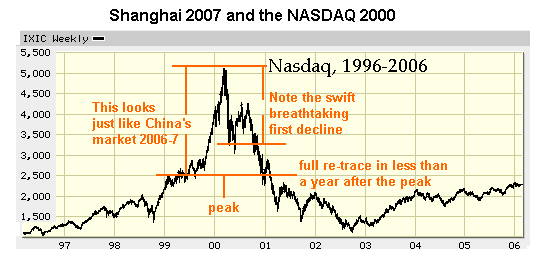
Frequent contributor U. Doran sent in two links describing the unsustainability of the Shanghai stock market: China Crash - domino effect on US markets (great charts) Shanghai stock bubble compared to Nasdaq bubble (stunning charts) Longtime correspondent Albert T. sent in this link describing the cooling real estate market in Shanghai: Shanghai eases land restrictions for foreigners: Concerned about a slowdown of contracted foreign investment, the Shanghai municipal government has eased restrictions to lure foreigners to invest in property development again, in a reversal of an earlier policy aimed at cooling down the real-estate sector.Albert summarizes the situation thusly: This is an interesting development. I smell a bubble bursting, and they need the final sucker to bail out the speculators (everyone).When everyone is a speculator playing with borrowed money, it's a mania/bubble, regardless of the nation or the era--and all mania/bubbles end the same way. If you need further evidence that the bubble in the Shanghai stock market is a mirror of the bubble in Shanghai real estate, consider this tidbit from Shanghai slump as China cools markets: An indicator of the widespread speculation gripping the Shanghai exchange came last month with a Chinese government website reporting that one in 10 maids in the city, China's financial capital, had quit their jobs to take up trading full time.When maids are quitting to play the stock market and local governments are relying on flipping stolen land to speculators, the mania/bubble is clearly about to burst. Maybe afterward, when people have lost their fortunes and their anger knows no bounds, then a more sustainable model of development will arise. Thank you Riley T. ($30.00) for your second generous and very unexpected donation. I am greatly honored by your ongoing support (and dystopian wit). All contributors are listed below in acknowledgement of my gratitude. If you found value here, perhaps you'd like to Your readership is greatly appreciated with or without a donation. Why Interest Rates Will Have to Rise May 30, 2007 This may be one of the most important entries of the year. I admit, it's not truly earth-shattering like the news of which airhead starlet has been arrested this week for a DUI on the Pacific Coast Highway, but since it's about money on a global scale, it might be of some interest (pun intended). Let's go through the standard reasoning about interest rates. One school of thought believes that the bursting of the global debt bubble will lead to deflation, and this will cause the Federal Reserve to lower interest rates in order to keep the bubble (borrow and spend) economy pumped up. The other school of thought foresees inflation or even hyper-inflation as the inevitable result of a hyper-inflationary monentary policy (easy lending, low rates, endless funds available for lending). To save what's left of the dollar, the Fed will eventually have to raise interest rates. What if both scenarios are missing the point? What if interest rates will have to rise regardless of inflation or deflation or the slowing economy? Let's start with a chart, courtesy of www.brillig.com (the debt clock). This is an inflation-adjusted depiction of the U.S. National Debt--the debt which has accumulated from years of massive deficit spending and borrowing from foreign entities. (The comments in black are mine.) 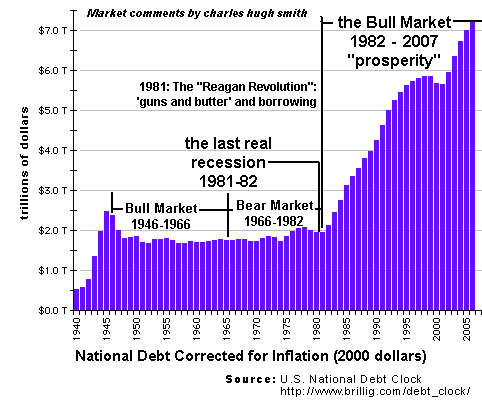
Do you notice the tiny little difference between the previous Bull Market era of prosperity (1946-1966) and the current era of "prosperity"? Hmm, this is a tough one. . . could it be those decades of massive, explosive deficits? What kind of "prosperity" requires borrowing trillions of dollars to sustain it? Can it even be called "prosperity" if a significant driver was borrowed money? Even during the "non-prosperous" Bear Market era of stagflation in the 70s, the nation didn't borrow much more than it had during boom times (adjusted for inflation, which rose in the late 70s and early 80s). For a comparison of that era and our own, let's turn to correspondent Mark P.'s recent observations: (emphasis added) I was reading this article on rising gasoline prices and started to think about the past, particularly the late 70s when I was a kid.Mark's commentary led me to this conclusion: the debt is already so large, the Treasury will soon have no choice but to raise long-term interest rates. To see why, let's look at another chart: 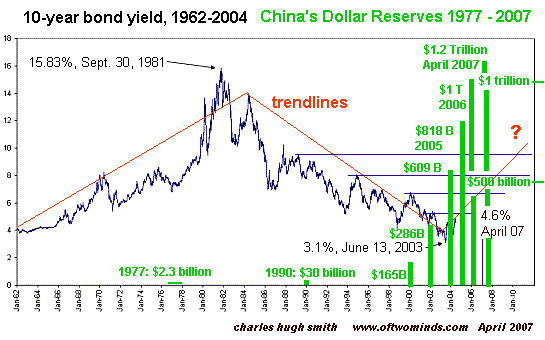
Notice how the Chinese central bank has ramped up its purchase of U.S. Treasuries to what is clearly an unsustainable rate. Before we go on, let's recall a few key points: The cliche repeated in the mainstream media is that China continues buying hundreds of billions of U.S. bonds every year as a "safe" investment." How "safe" is an investment which has lost 1/3 of its value in the past 5 years? (The dollar Index has fallen from 120 in 2002 to 82.) We all know the real reason China has been pouring the vast majority of its foreign reserves into Treasuries--to support low interest rates and therefore the purchasing power of the dauntless "borrow and spend" American consumer. The larger question is: how sustainable is a debt machine dependent on the fortunes and good will of one's trading partners? What could cause the Chinese to cease new purchases or to even start selling Treasuries from their horde of $1.3 trillion? (It's rising by about $125 billion a quarter.) Once the Chinese either decide to stop supporting the U.S. debt machine, or find they no longer can do so regardless of their desire, the market for low-interest rate Treasuries dries up. Yes, the Gulf states are big buyers, too, but there is no evidence they can double or triple their bond purchases to cover what China currently buys. How vulnerable are we? Very. One solution is to stop running deficits of $300 - $400 billion a year; that would be $400 billion less debt we need to find buyers for. But which of our elected officials would have to courage to cut $400 billion in spending? The real problem is the debt is already unsustainably large. Even if we as a nation stopped spending more than the government collects, the existing debt constantly rolls over and has to be refinanced. If money dries up globally, we are in a real pickle. With a negative savings rate, does anyone seriously believe we can fund our own deficit? And here's one more "follow the money" line of thought. Who gets hurt if the Treasury refuses to support the plummeting bond/dollar by raising interest rates? Joe Sixpack? Not really. How much does Joe Sixpack buy that is made in Europe or Japan? The Japanese nameplate vehicle he buys is actually made in the U.S.; only the profit is repatriated to the home country. If he travels outside the U.S., then the weak dollar will hurt his purchasing power--but how often does Joe Sixpack go to Europe or Japan? (Recall that the Chinese yuan is pegged to the dollar and does not fluctuate much even as the dollar tanks.) As for food--it's mostly priced in dollars. Ditto oil/energy, so a plummeting dollar will have little effect on Joe's purchase of these commodities (unless OPEC starts pricing oil in euros. Then it's Katie Bar the Door.) No, the big losers in a bond/dollar collapse are the wealthy. As documented here many times (via links to the Wall Street Journal), the top 5% of U.S. citizens own about 2/3 of all the stocks, bonds and real estate in the country. If the bond and/or dollar drops through the floor, their holdings will be worth a lot less globally--and the wealthy of the world are global players. So ask yourself: if our patsy trading partners are no longer willing or able to gamble all their surpluses on the dollar and Treasuries, or we have finally worn out our welcome in China and the Gulf so that politicians/bankers in those regions decide to stop supporting low interest rates in the U.S., then will our politicians really care about Joe Sixpack losing his bubble-priced home? The short answer is no. They will care about the wealthy, who fund their campaigns. Joe Sixpack doesn't even bother to vote (U.S. voter turnout is barely 40%; in the recent French election, turnout was 85%.) Yes, there will be tearful speeches and a lot of hot air expended about poor Joe, but when push comes to shove, the Treasuries have to be sold--there is no Plan B--and the wealthy's holdings in dollars will have to be defended. Joe Sixpack? Sorry pal, suck it up; you blew it signing that adjustable rate mortgage and paying bubblicious prices and tapping all your equity with a home equity line of credit. Too bad you believed all that mainstream media shuck and jive about interest rates staying low forever. Thank you Abrey M. ($25.00) for your generous and quite unexpected donation. I am greatly honored by your support. All contributors are listed below in acknowledgement of my gratitude. If you found value here, perhaps you'd like to Your readership is greatly appreciated with or without a donation. What to do about Health Care? May 29, 2007 Here is the one essay you need to read this year about healthcare in the U.S. It will change your perspective, for it offers contexts and solutions I've read nowhere else. I asked frequent contributor Michael Goodfellow to write down the many healthcare-related ideas we've shared via email, and he's written this perceptive, thought-provoking essay: What to do about Health Care? Here is the first paragraph: Charles asked me to write something about the health care system in the U.S., but before I do that, I should add a few words about my own situation. The opinions below could be read as a rant by some overpaid techie who has never been sick a day in his life. Sadly, that is not the case. I sustained a spinal chord injury at age 7, and have spent the rest of my life in a wheelchair. Long-term paralysis leads to other complications, and so I now have multiple serious conditions. I have seen more than my share of the health care system.For another "real world" window on our healthcare system, please read yesterday's entry, "The Test of a Nation." After pondering this critically important issue, you might enjoy an amusing serving of witty parody, Memo to the next UK Prime Minister by Protagoras. The Test of a Nation May 28, 2007 A Memorial Day thought: The test of a nation's commitment to its Armed Forces veterans is two-fold: how they are treated during a war, and how they are treated five, ten and twenty years later. With some 60% of Iraq War veterans experiencing some form of PTSD (post-traumatic stress disorder), I have to wonder if we as a nation will abandon the vets as soon as the war winds down, as occured after Vietnam. I hired many Vietnam vets when I was a builder in the early 1980s, not because they were vets (I didn't ask) but because they were looking for work. A number had psychological problems relating to their service in Vietnam; these problems included extreme withdrawal, outbursts of rage, and inability to concentrate. Others were drifting through their 30s, camping at the beach, while one set of brothers took their Mom with them wherever they found work. I rented a camper on the jobsite for their Mom and paid her a small sum to keep an eye on things. (She was one tough cookie; by her own choice she was armed, as she knew how to handle firearms.) Would the guys have been troubled even if they hadn't served "a one-year hike through the jungle" (one's apt description of his 'Nam duty as an infantryman)? Perhaps. Would the Veterans Administration facility on Oahu (Honolulu) provided sustained treatment for them? Perhaps. Did they even consider going in for treatment? Perhaps not. What I do know is that we as a nation shunned these vets, underfunded the VA system, and generally ignored PTSD or "blamed the victim" (aw, those guys are just whiners, etc.). I fear that once hostilities in Iraq wind down (for whatever reasons), the nation will quickly avert its eyes from the individuals who paid the price internally for their service and rush to cut the VA (and military readiness) budgets as the recession bites deeply into tax revenues. I hope we won't repeat the tragic cycle of postwar denial and abandonment suffered by many Vietnam-era vets, but I am not confident that our nation will choose to spend money to support our vets long after the war is over. I fear the powerful constituencies protecting entitlements (Medicare, etc.) and pork projects will raid the VA budget to protect their own turf. For you see, vets are not politically powerful; those who are suffering often do so privately. And you can be sure the puffed-up pundits who have glorified the war will be the first to forget the vets who actually served. Continuing on the theme of responsibility: Knowledgeable correspondent Nurse Dorothy offers an "in the trenches" reaction to the May 24 entry on health and healthcare. I believe her comments are extremely important, and speak to issues which are virtually ignored in the mainstream media and the halls of Congress. Here is the chart she refers to: 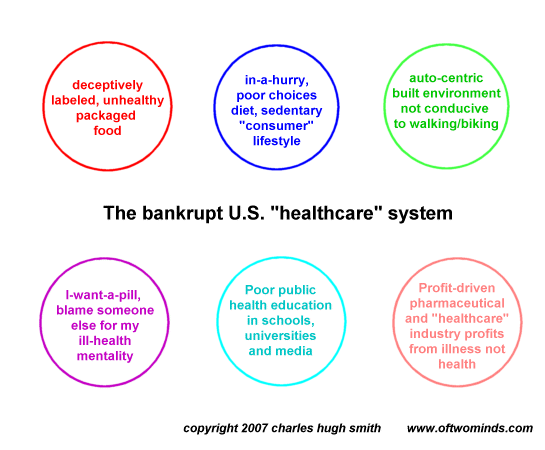
This is in regards to March 24th Health and Bankruptcy article. I know it's a little late in responding, but I just came off of a four day stretch at work. In that article there is a purple circle which says "I want a pill, blame someone else for my ill health". That statement screamed at me because it's so true. I have the perfect example.Thank you, Nurse Dorothy, for "plain speaking" to an issue we as a nation refuse to address: personal responsibility. Those of us who know working physicians and/or administrators in the "healthcare delivery systems" (i.e. hospitals and providers) know the medical malpractise system is utterly broken. Yet at the same time, I wonder if a class-action lawsuit might not be the only weapon vets will have to channel funding to the VA when its budget is slashed to protect more politically powerful government-funded fiefdoms. Responsibility is two-fold: as a nation, we are responsible for the care of those who served, especially those who served in combat. We must keep in mind two things: service is voluntary, and the orders to go to war come from our civilian, elected government, not the Pentagon or senior military officers. Therefore we as a people sent them to war, and we are duty-bound to take care of them, regardless of the war's outcome. As individuals, we are responsible for our own health. It will come down to this, readers: we can either fund our VA hospital system, or we can pay for irresponsible civilians like Nurse Dorothy's trigger-finger-on-a-lawsuit patient. There won't be enough money for both, and we as a nation will have to choose who gets our support. My vote will always be for full VA funding, above all else--even\ my own Medicare benefits, should there be any left when I qualify. Today, and every day, my thoughts are of our friends who are serving in Iraq. Words fail me; just look at this photo. 
Thank you Michael S. ($25.00) for responding to my Memorial Day offer of a signed copy of my novel I-State Lines. I am greatly honored by your support. All contributors are listed below in acknowledgement of my gratitude. This Week's Theme: Why The Truth Can't Be Told Memorial Weekend Amazing Offer In keeping with this weekend's great theme--no, not sacrifice for the nation and liberty--you know it's "two days only! Blow-out savings!" marketing and sales-- I am offering an incredible value here relating to a numerologically significant event. In an astonishing show of support, 99 of you stalwart generous readers have donated money to this site in the past two months. Others have sent me boxes of their favorite peanut butter (after I noted the difficulty in finding an honest peanut butter unadulterated with hydrogenated palm oil or high-fructose sugar), a music CD by a favorite local musician, and a beautiful handcrafted wind chime designed to celebrate the U.S. Constitution.  In the spirit of blatantly cheesy marketing which dominates this weekend, I am offering the 100th
person who donates cash to the site a free collector's copy of my novel I-State Lines,
which is suitable for holding down paper on your desk or propping up a wobbly table. Please note
that the book costs me $10 from my publisher (yes, surprisingly, a highly honored small publisher
of literary fiction,
The Permanent Press of New York) and $2.13 media mail shipping.
In the spirit of blatantly cheesy marketing which dominates this weekend, I am offering the 100th
person who donates cash to the site a free collector's copy of my novel I-State Lines,
which is suitable for holding down paper on your desk or propping up a wobbly table. Please note
that the book costs me $10 from my publisher (yes, surprisingly, a highly honored small publisher
of literary fiction,
The Permanent Press of New York) and $2.13 media mail shipping.
If you read fiction, you'll enjoy browsing their current and past offerings on their website; you'll probably find something which fits your tastes in their selections, which often win literary prizes. Recently published works include the true story of a Boston Madam (yes, that kind of Madam), several family dramas, a Cold War story and a mystery set on Long Island. The actual value of my book may vary, depending on your acceleration and tire pressure; when viewed in a mirror, it may appear larger than in real life. Fluctuations in polarity may result during reading. Side effects include drowsiness; do not operate large complex machinery while reading. It's kind of cool to have a book personally inscribed by the author on your shelf; at least as a reader, I think so. For it creates an authentic connection between a mass-produced object (the book), the person who made it (the author) and the reader/owner. Those kinds of connections are rare in a "consumer society" where the value of an object is generally reduced to its price, utility and/or brand status. No wonder so many people feel dissatisfied and alienated; the more they shop, the more they buy, the more they own, the less they actually get. The objects they buy/own are simply grist for an empty cycle of buying, storing and then selling/giving away/disposing in the local landfill. There's not much connection left between the people who make objects of not-entirely visible value and the people who value them. If you're sick to death of marketing and hype but can't resist this fantastic, one-of-a-kind offer for the 100th reader who wildly abandons reason and sends in a donation, then Your readership is greatly appreciated with or without a donation. The Coming Bankruptcy of Government May 25, 2007 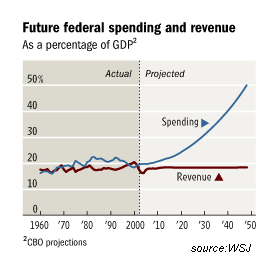 Waste and the Federal government are basically synonymous. The list is basically endless,
but just to hit the highlights:
Waste and the Federal government are basically synonymous. The list is basically endless,
but just to hit the highlights:
The above chart shows where all this is heading: national bankruptcy. Expenses (entitlements, Homeland Security, Defense, interest on debt) are rising far faster than income (tax payments) and will soon skyrocket beyond any hope of borrowing to fill the gap. In other words, blah blah blah. Nobody cares--yet. So let's turn our attention to local government, which is also teetering on insolvency nearly everywhere even at this peak of "prosperity." By local government I mean not just cities, counties and states but also school districts, municipal water systems, university systems, housing authorities and the vast array of other governmental bodies which live wholly or partially off tax receipts. For an aperitif, let's take a quick look at a few examples of the waste, fraud, "gaming the system" and insanely optimistic financial projections which are built into local government. Extra pay, perks continue to flow despite scandal; U.C. Officials override rules to give more than $1 million to 70 execs. Dead Tenants Get Low-Income Housing; City Blames Staff. The Berkeley Housing Authority has paid rent on at least 15 units where tenants are dead—as much as two years of rent on the deceased, failed to inspect units where substandard conditions exist, and allowed ineligible family members to “inherit” a unit ahead of others on the waiting list.Allow me to summarize: A city agency has been "troubled" i.e. incompetent, fraud-ridden, etc. for five long years before the city finally takes action. Then the employees and managers are rewarded for their fraud and incompetency with lifetime employment and rich lifetime benefits. Predictably, the public employee union is already threatening action against the city. Service Employees International Union 1021 officials said Wednesday they are seeking legal advice regarding the council action, as it may have violated workers’ contracts.In other words: there is simply no level of fraud or incompetency which public employee unions will not defend to the bitter end. Frequent contributor Albert T. sent in this story about a 65,000-employee public pension plan which is finally facing the realities of slower stock and bond market returns. The stupendous under-funding of public pensions is a little-noticed iceberg we as a nation are about to hit. The holiday's over: Regents' plan to reinstate contributions to pension plan is a watershed event for UCRP and its members Nationwide, the New York Times reported, "state and local governments owe their current and future retirees roughly $375 billion more than they have committed to their pension funds" by one estimate; that number balloons to $800 billion, it wrote, "if America's state pension plans were required to use the same methods as corporations." Public-employee pension funds are not covered by federal pension law, held to a uniform accounting standard, or protected by the PBGC; instead they're governed by boards with relatively little oversight, and must appeal to the taxpayers to fill the gap if they end up in the red.Many eyes on the pension prize: UC Regents' plan to restart contributions to the UC Retirement Plan (UCRP) in July 2007, following a 16-year "holiday" during which UC and its employees did not pay into the pension fund.Allow me to summarize the situation nationwide: The outsized gains in the stock and bond markets in the 90s infused managers of public pension funds with the irrational exuberance that such returns were now "normal" and could be counted on indefinitely. Therefore, most pension plans inserted wildly improbable annual returns in their projections. Alas, 16% annual returns turned out not to be normal but a brief aberration. In those heady days, so great were the returns that public employees didn't even have to contribute a dime to their own pension plans. Now they are up in arms because they actually have to contribute a small (1%-2%) amount of their salaries to their own pension plans. The debate now rages between those who want the pension fund to be "actively managed," which generates hundreds of millions in fees for outside financial management firms, or "passively invested" in index funds. Albert made this point about "actively managed" funds: Actually funny a little since we are on the topic there was an article review I did for one of my classes on an article from journal of finance about fund management. Basically 80% of funds fail to cover their fees and perform worse than the benchmark they pick. Only 10% of funds cover their fees with returns in excess of the benchmark. There was one funny thing in that paper: basically about 120+ funds did -5% per year or less but by luck alone only 60+ funds should have... So the others are there due to "skill".What nobody in the public pension world seems to address is the possibility--or even the extreme likelihood--that annual returns on their funds could be a negative number for years to come. Everyone seems to have forgotten that stocks and bonds can actually drop in value for years. What happens when the fund drops 16% per year for a few years, rather than grows by 16%? Longtime contributor Harun H. neatly summarized a similar "unvirtuous cycle" of declining tax receipts facing local governments: Despite a stock market setting “new highs” even states are struggling to make ends meet. What happens as property values continue to collapse forcing a downward readjustment of property taxes causing a drop in tax receipts followed by a sharp increase in unemployment causing an even greater drop in tax receipts, followed by sharply decreasing corporate earnings due to fall off in consumption causing an even greater decrease in tax receipts.Just how painful this cycle will be can be ascertained by looking at the phenomenal growth in property values (and thus property tax receipts) local governments have enjoyed. For example, Florida: 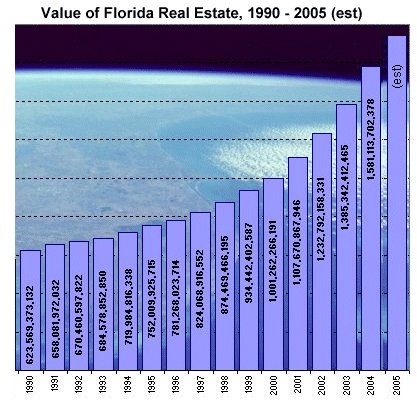
There is one more massive piece in the coming cycle of declining tax receipts: the destruction of small business. Correspondent Brian H. files this report, which all of us self-employed /small business proprietors can instantly relate to: It’s not just healthcare, it’s all the endless mind-numbing rules by our beloved nanny-state government.Every year we pay over $1,000 "city business license" for the stunning privilege of operating a legitimate business in this city. This is a percentage of gross income, not net, meaning if you are losing money, the city doesn't care: you pay them first out of gross income. This kind of "junk fee" which returns absolutely no benefit, and which seems to rise by leaps and bounds every few years (the city just raised another small-business tax by about 30%) is rife in local government. And do you know the predictable result? Small businesses are closing, going out of business. If you don't think this is a reality, you need to get out more. And with the loss of those tax receipts, you also lose jobs. The media loves to focus on big corporations, but the real engine of employment growth is small business. Once you strangle that sector with rules, fees and taxes, then you've strangled both your tax and employment base. Astute observer/correspondent Riley T. sent in a report which nicely summarizes the two issues of unaffordable/underfunded public pensions and the wearing down of small businesses: I know this will sound crazy but I wonder if there really is something in the water. No one seems to care about what's going on. I can't find anyone I know personally that can even imagine that something could go wrong. A good friend has a navy pension, a California state pension and Social Security it is impossible to get him to even think that something might go wrong. I have a nephew who had saved up $6500 and he used every penny to buy a juke box.So why don't we read more about these issues? We can only speculate, but the fact that the print media itself is largely unionized may have something to do with the limited coverage of public pension plans and local government fraud/waste/gaming the system. Since the reporters and editors are union members, their sympathies rather naturally reside with public employees, not with the small businesses which ultimately support the local government with direct taxes and the jobs which also generate taxes. Now let me state yet again that many public employees I know are hard-working, conscientious people whose offices are chronically understaffed. The problem is that the system--the agencies and their unions--enable or even encourage incompetent/lazy workers to "game the system" to milk maximum pension and retirement benefits. And what kind of work ethic and productivity do you engender when employees know they can never be fired, no matter how much they rip off the public they supposedly serve? To claim this is not a pervasive, deeply eroding problem is to simply be in denial. So when will these issues gain attention? When local governments start declaring bankruptcy to get out from contracts that are no longer affordable, when pension plans fail, and when tax receipts plummet. But we're not there quite yet; perhaps 2008 will be the first year of reckoning. Until then--The Truth Can't Be Told. Except perhaps on page B-27, every once in a while, without charts, graphs or splashy headlines, just a boring little sidebar no one notices. Thank you Michael M. ($16.00) for your unexpected and generous donation. I am greatly honored by your continuing support. All contributors are listed below in acknowledgement of my gratitude. If you found value here, perhaps you'd like to Your readership is greatly appreciated with or without a donation. This Week's Theme: Why The Truth Can't Be Told Health, Healthcare and Bankruptcy May 24, 2007 If I were a small-business employer, I wouldn't hire myself. Why? I'm over 50. Maybe I'd hire myself for cash, more or less like a day laborer; but as an employee with healthcare and other benefits? Are you insane? The healthcare premiums are over $1,000 a month. Would I hire a guy or gal with three kids? Heck no, same reason. Bennies cost too much. Would I hire a diabetic or person with chronic health conditions? No way. Would it make financial sense for me to hire a no-benefits contract worker, or a "non-legal" worker for cash? Absolutely. Some readers have pointed out that employee healthcare costs are not an issue to global companies like Exxon, but the truth is large multinational corporations have been shedding jobs in the U.S. in favor of foreign-based workers for years. This is largely the result of global reach--it only make sense to grow your workforce where your markets are also growing--but I doubt Intel et. al. are entirely impervious to rising medical and pension costs in the U.S. For a snapshot of an ailing U.S. company in an ailing industry, consider these "legacy costs" for auto maker Chrysler: In for an overhaul. Cerberus Capital Management, a New York private equity firm, will pay $7.8 billion for the iconic automaker, with almost all of that going to recapitalize Chrysler.That $30/hour isn't wages--the Japanese aren't paid $10/hour and the U.S. worker paid $40/hour. It's the "overhead" costs for medical insurance, pensions, vacation, sick-leave, etc. It's painfully obvious that the only way Chryler will survive is if the $18 billion in pension obligations and the ongoing billions to pay for generous healthcare and other benefits are slashed/eliminated. The heading-for-bankruptcy "healthcare" system in the U.S. is the elephant in the room no one wants to talk about when it comes to "saving or creating jobs" in the U.S. Capitalism can be boiled down to this: capital will flow to the highest returns. Once the burdens of healthcare, sick leave, etc. become too onerous then capital will leave for higher-return climes and businesses. So let's get real. The decision for global corporations isn't between jobs in the U.S. and China--it's between expanding the workforce in China or India, Vietnam, Poland, Brazil, etc. It's also inaccurate to keep talking about cost, as if the problem with healthcare in the U.S. was simply money. It isn't. It's an entire system of ill-health: 
I have discussed the packaged food industry's game of shuck-and-jive when it comes to labeling the food you're eating: "organic" peanut butter loaded with hydrogenated palm oil, the high-fructose sugar laden bottled beverage which contains "two servings" as a way of making the calorie count look reasonable, and on and on. Pet food is much more accurately labeled than human food. I have also discussed how our built environment is not condusive to walking and biking--the easiest ways to get some exercise. The waste, fraud and poor results which result from a litigious, ill-informed, profit-driven society's attempts to "fix" poor health with pills and surgery is too well documented to be worthy of elucidation. Everybody knows this but no one wants to make the sacrifices/trade-offs necessary to get past these barriers. So we're left arguing about how to pay for a broken system which is heading off a cliff of fiscal insolvency. Rather than talk about reality--that the broken, inefficient, ever-more-costly "healthcare" system is a key driver in why good jobs are disappearing in the U.S., we argue about details--the classic "rearranging the deck chairs on the Titanic"--as if a cost-based debate will solve poor diet, unhealthy food, sedentary, passive "consumer" media-centric lifestyles, greedy pharmaceutical companies, public hospitals hovering on the brink of financial disaster, and a host of other ills of our system too long to even list here. So why can't we have an honest discussion of the many causes of this catastrophe? The answer is profit: the immensely profitable web of the food industry, the doctor-owned clinics, the drug companies, the paper-pushers who bilk Medicare, the public "healthcare" companies, etc. If the system were revolutionized to make health an incentive rather than the current system in which ill-health is "the profit center," then all the profitable apple carts would be overturned. And that is Why The Truth Can't Be Told. Here's one more chart for your review: 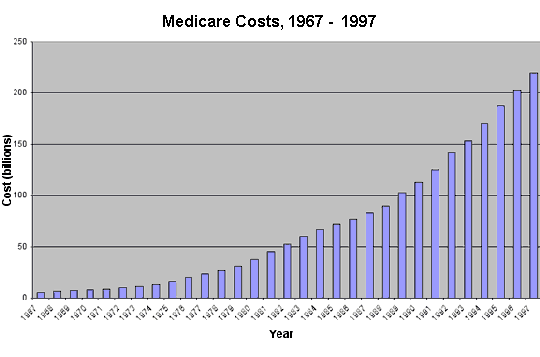
Thank you Jon H. ($50.00) for your unexpected and extremely generous donation. I am greatly honored by your continuing support. All contributors are listed below in acknowledgement of my gratitude. This Week's Theme: Why The Truth Can't Be Told Ugetsu: Greed Is Not Good May 23, 2007 One of the great pleasures of studying another culture in depth--its language, geography, history, literature, food and film--is the discovery of universal truths through a different lens.  With that flourish, I introduce the 1954 Japanese film
Ugetsu
With that flourish, I introduce the 1954 Japanese film
UgetsuOne reason is the movie's haunting visuals (in glorious black and white); once you've seen the film a few times, you may be hard-pressed to pick your favorite sequence; mine is the two "heroes" deathly quiet voyage across the mist-bound lake. But the deeper reason why this is such a compelling and unforgettable movie is its unerring depiction of the destructive force of human greed. Greed is a "standard-issue emotion, human being 1.0"--we all know the sensation of desiring wealth, power and prestige. What's changed is that where greed was once a Mortal Sin, it is now an unalloyed Good Thing. Just for your review, here are the seven deadly/mortal/cardinal sins: It doesn't take a theology student to note the over-arching theme of greed/unlimited desire for more than one's fair share in this list; what is pride but the desire to display the results of your greed? What is envy but thwarted greed? What is lust but sexual greed? What is gluttony but greed for food? Just how greedy has our culture become? Item 1 for the prosecution: hedge fund managers are making up to $1 billion each (average is $360 million for the top 10): Who's Getting Alpha? (February 15, 2007) Item 2 for the prosecution: LUXE POPULI: Spending for luxury items is increasing four times as fast as overall expenditures as ordinary Americans go for the gold. It's instructive to consider the $1 billion some financial manipulator earned for producing no goods or services with someone who is worth a $1 billion as a result of creating goods and services which generate jobs, value and tangible wealth--say, Steve Jobs. Leaving aside his personality--by most accounts abrasive, abusive and volatile by turns--let's recall what created Mr. Jobs' great wealth: the desire to build something which was "insanely great." This he went on to do, with plenty of help from PARC, Mr. Wozniak and many others. Nonetheless, his zeal was not purely financial greed. This used to be the Standard Issue American Dream: to create great wealth via hard work or innovation or some combination of the two. This vision quest has now been reduced to pure greed for wealth or status by any means. Many observers find this "greed is good" ethos best represented by the Reagan-era film Wall Street Hmm--sound familiar? Examples abound in all cultures. Look no further than the Chinese stock market mania currently playing out in the Shanghai Composite. For a chart of that madness, go to Mish's recent post (recommended by U. Doran). One consequence of the "greed is good" mentality which has infected the entire globe is that we are essentially eating our seed corn by feasting today. In the U.S., one way common manifestation of this is the extraction of most or all of the equity (savings/wealth) from one's house via home equity lines of credit (HELOC) or mortgage equity withdrawals (MEW) to spend or "invest" (speculate). Schahrzad Berkland, proprietor of the California Housing Forecast describes the phenomenon succinctly: You're right on with the MEW (mortgage equity withdrawal). My realtor friend who lives on the water in (San Diego), has gone through tax records and found lots of MEW among her neighbors. Some of her neighbors almost paid cash for their homes 10-20 years ago, and then took out $1 mil loans! One of the people with a $1 mil MEW drives a $150K sports car. I suspect they used that money for investing...why would someone who was frugal their whole life all of a sudden go on a spending spree though? Maybe some of the money went for investment property?Back to Ugetsu. I won't ruin the film for you--well worth renting, and yes, it's subtitled, but you'll soon forget that--but the heart of the story is two brothers' desire to get rich in a time of civil strife by leaving their poor but loving families. The fundamental illusion--that wealth will bring happiness--is illustrated with a supernatural story element which will take you by surprise. Alas, the brothers discover the hard way that greed brings not happiness but destruction of all that was good in their lives, all that mattered, all that was valuable, all that was genuine. When will we re-discover this as a culture/people/species? We all know why Greed Is Currently Good: because consumer and speculative greed is immensely profitable. And that is Why The Truth Can't Be Told. Check out 10 new readers' commentaries on a wide variety of topics, and their many excellent link and film recommendations--just click on Readers Journal in the upper right sidebar. Also read "Memo to the next UK Prime Minister," a tongue-in-cheek proposal on a topic near and dear to all of us--taxation. Thank you Anton L. ($40.00) for your unexpected and very generous donation. (And you bought a copy of my novel, too!) I am greatly honored by your continuing support. All contributors are listed below in acknowledgement of my gratitude. This Week's Theme: Why The Truth Can't Be Told The Future Shortage of Energy May 22, 2007 Longtime contributor Riley T. checked in recently with a cogent summary of Peak Oil and its consquences: I would like to start with my observations about how humans process information. When something enters the mind the first thing we do is compare it to similar things from our past, then we compare the new thing to the similar things and look for differences. We compare and discriminate to process new information. If we treated all new information as unique we would over load and brain freeze ( technical term ). This works most of the time. 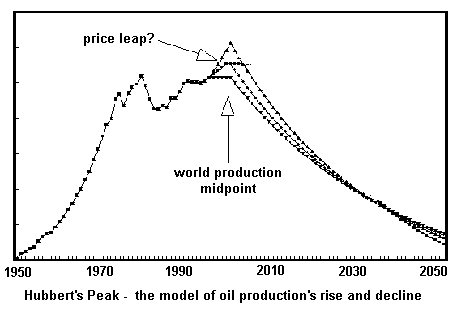
Frequent contributor U. Doran just happened to send in a link describing the decline of Saudi Arabia's largest oil field: Depletion Levels in Ghawar, Saudi Arabia (Updated) He also recommended a wide-ranging essay which ties Peak Oil into a larger context of human folly: Busy Bee Bugaboo and another Unsuspected Agent of Doom. And this coverage of looming resource wars over oil: China and USA in New Cold War over Africa’s Oil Riches Darfur? It’s the Oil, Stupid... Correspondent Michael Goodfellow recommended a fascinating piece on energy and politics: Media Ignore European Energy Politics to Advance Global Warming Alarmism. Michael selected the following passage as being worthy of note: Swiss experts expect first shortfalls in electric power supply to occur within the next five years. And the energy department in Bern is already busy working on a so-called cut-off plan. Electricity suppliers are already counting on periodic power cuts to entire towns and industrial zones within the next years. Today we cannot begin to imagine twelve hour power cuts in entire cities like Zurich or Frankfurt. 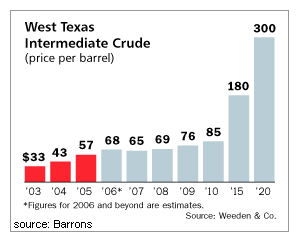 Michael also sent along this story on the decline of the U.S. oil industry,
A Wildcatter Pounces .
Michael also sent along this story on the decline of the U.S. oil industry,
A Wildcatter Pounces .
And now, connect the above dots to this story: High gas cost won't drive away buyers of big SUVs After 2-year slump, demand rebounds. And that is Why The Truth Can't Be Told-- at least not by the mainstream press or broadcasting empires. Thank you Rebecca T. ($20.00) for your unexpected and quite generous donation. I am greatly honored by your support. All contributors are listed below in acknowledgement of my gratitude. This Week's Theme: Why The Truth Can't Be Told Why China Is Being Scapegoated May 21, 2007 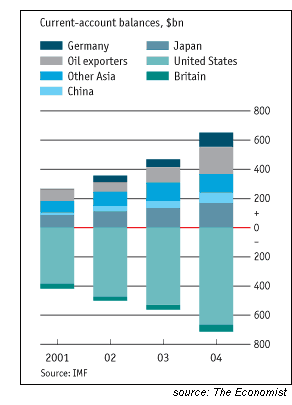 We're tackling a big topic today with lots of charts: Why Congress is scapegoating
China. Here's the issue in a nutshell. We all know the U.S. runs a big trade deficit with
China, a deficit which is growing. (As this chart shows, we also maintain a deficit with
Japan, Germany, the EU and virtually every other trading nation.)
We're tackling a big topic today with lots of charts: Why Congress is scapegoating
China. Here's the issue in a nutshell. We all know the U.S. runs a big trade deficit with
China, a deficit which is growing. (As this chart shows, we also maintain a deficit with
Japan, Germany, the EU and virtually every other trading nation.)
The problem, our astonishingly stubborn elected officials believe, is that China's currency, the renminbi or yuan, is undervalued. China pegs the yuan to the dollar; a few years ago it was 8.25 to the dollar, and now it's under 8. Congress apparently believes those who say the yuan is undervalued by 40%--meaning it should be about 5 to the dollar. If this came to pass, then Black and Decker would instantly move their factories from China back to the U.S. as it no longer made financial sense to have factories in China. This is so wrong-headed it boggles the mind. First, Black and Decker et. al. have factories in Asia because that's their fastest growing market. It makes sense to make stuff there--and many of the components are made there, too. Second, wages in China could rise 40% (via the currency devaluation Congress so keenly desires) and that would mean the factory wage of $200 per month would rise to $280--compared to an average U.S. wage of $3,000 (don't forget the mandated benefits and healthcare). Did anyone notice that unemployment in the U.S. is at multi-decade lows of 4.5%? Is "saving jobs in America" really our most pressing issue? And how does devaluing the yuan actually "solve" that problem? All it does is make Chinese products 40% more expensive to U.S. consumers. 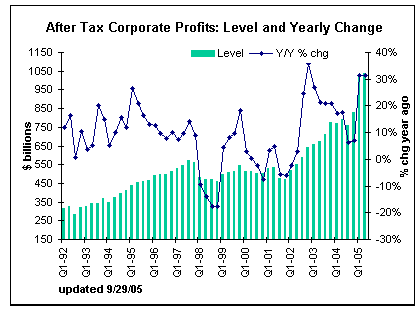 If you're making widgets in China, are you moving the factory back the America now? No, you're squeezing your
Chinese suppliers to find 30% cuts in production costs, or moving the factory to Vietnam, where the
average wage is $150/month. As this chart reveals, U.S. corporate profits have been on an
absolute tear during the rise of the trade deficit with China, skyrocketing to the unprecedented height
of $1.3 trillion--fully 10% of total U.S. GDP. Gosh, do you think there's a connection?
If you're making widgets in China, are you moving the factory back the America now? No, you're squeezing your
Chinese suppliers to find 30% cuts in production costs, or moving the factory to Vietnam, where the
average wage is $150/month. As this chart reveals, U.S. corporate profits have been on an
absolute tear during the rise of the trade deficit with China, skyrocketing to the unprecedented height
of $1.3 trillion--fully 10% of total U.S. GDP. Gosh, do you think there's a connection?
Of course there is. You know that $200 iPod that's made in China? Well, about $20 stays in China, because the factories assembling the iPod are owned by Apple, and many of the components are made in factories owned and operated by Taiwanese, Korean and Japanese corporations. China owns very little of the supply chain for the iPod. Manufacturing in hyper-competitive China is a low-profit venture; as I have posted here before, BusinessWeek stated that average profit margin for manufacturers in China is 1%-3%. Did Steve Jobs become a corporate god by generating profit margins of 2%? No. The real meat of the money--the $180 of the retail price--goes to Apple (huge profit margins), the wholesalers /distributors, and the retailers--all in the U.S. But does Congress even "follow the money" in the real world? Clearly, no. With a gracious thank-you to Mish, here is a link to Stephen Roach, Economist for Morgan Stanley, stating that Congress is in no mood to listen to reality; across both parties, politicos have already decided the solution to America's ills: Past the Point of No Return. Correspondent James C. recently contributed this observation to the Readers Journal: 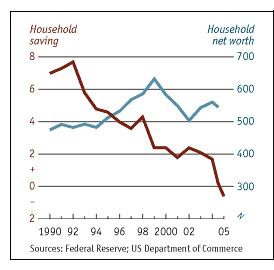
I have some strange measures of the American consumerism patterns. I count self storage buildings in the areas that I travel and also monitor how many bags of trash people take out on trash day. (I have never claimed to be normal) There is some virtue to this kind of study. One has to purchase, and then throw away, a lot of stuff to have 5-6 bags of trash at the curb each week. Our household consists of my wife and myself. We usually have one bag of trash each week. Across the street is a household consisting of a husband and wife and they generally have at least 5 bags of trash. Are they 5 times as happy as Barbara and I?As this chart reveals, Americans are saving not just zero, but actively spending money they don't have--a negative savings rate. The only other instance where Americans drew cash from savings was during the Great Depression. But we're living in a time of "prosperity," remember? 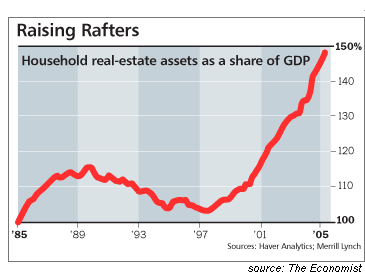 So where is all this wealth that consumers are spending so freely coming from? From
the extraordinary rise of real estate values in the U.S. As this chart shows, real estate
assets as a percentage of U.S. GDP has reached unprecedented heights. (That's a phrase which gets
repeated here often.)
So where is all this wealth that consumers are spending so freely coming from? From
the extraordinary rise of real estate values in the U.S. As this chart shows, real estate
assets as a percentage of U.S. GDP has reached unprecedented heights. (That's a phrase which gets
repeated here often.)
To view charts showing unprecedented consumer debt accrual via re-financing ( a.k.a. "the housing ATM"), please scroll down to the entry of May 11.  Lest you think U.S. consumers are profligate wastrels while Congress is a gleaming tower
of fiscal virtue, consider this chart. Yes, that's bankruptcy looming on a national scale--
mandated expenditures (entitlements like Social Security and Medicare, and debt on the national
interest) will soon balloon so far above tax receipts that even the profligate borrowers in
Congress and the White House will be unable to borrow enough money from the rest of the world to
fund the gap.
Lest you think U.S. consumers are profligate wastrels while Congress is a gleaming tower
of fiscal virtue, consider this chart. Yes, that's bankruptcy looming on a national scale--
mandated expenditures (entitlements like Social Security and Medicare, and debt on the national
interest) will soon balloon so far above tax receipts that even the profligate borrowers in
Congress and the White House will be unable to borrow enough money from the rest of the world to
fund the gap.
The problem isn't the (often American or Japanese/ Taiwanese/ Korean-owned) factories in China or the yuan--it's that Americans save nothing and spend borrowed money lavishly. If you need proof, please read LUXE POPULI Spending for luxury items is increasing four times as fast as overall expenditures as ordinary Americans go for the gold. But like the distracted yuppie parent who can't bear to rein in their bratty, irresponsible child's excesses, Congress dares not tell the American public that they need to spend less and save more. But Why? 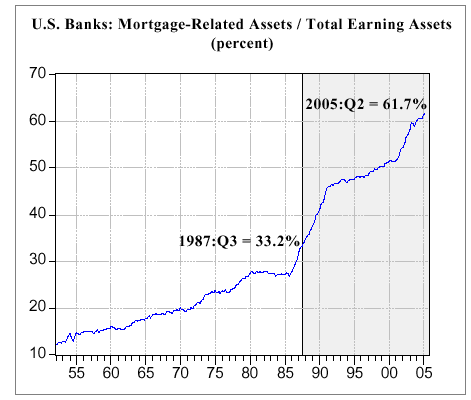 Here's the answer: the bankers would stop making money.
Here's the answer: the bankers would stop making money.
I can already here "free marketers" howling in outrage at my fingering bankers, but let's look at reality as carefully described in last week's BusinessWeek: The Poverty Business: Inside U.S. companies' audacious drive to extract more profits from the nation's working poor. Here's how it works: find people are who are poor credit risks, then offer them some credit--at an outrageous price and profit margin. What choice do they have? Basically none. Federal Reserve data show that in relative terms, that debt is getting more expensive. In 1989 households earning $30,000 or less a year paid an average annual interest rate on auto loans that was 16.8% higher than what households earning more than $90,000 a year paid. By 2004 the discrepancy had soared to 56.1%. Roughly the same thing happened with mortgage loans: a leap from a 6.4% gap to one of 25.5%. "It's not only that the poor are paying more; the poor are paying a lot more," says Sheila C. Bair, chairman of the Federal Deposit Insurance Corp.Did I mention that "you owe us forever" Sally Mae was recently bought by a private equity firm? I wonder why--could it be the debt which even bankrupcty can't trim? And who muscled that bankruptcy law through a complacent Republican-ruled Congress a few years ago? Your friendly U.S. bankers. If you foolishly believe the bankers have no political influence, I advise you to study the bankruptcy laws. Contributor/blogger/attorney Fred Roper can help set you straight on just how pernicious and anti-consumer rights this "bankers law" truly is. And if your naivete needs more bashing, please read this from the S.F. Chronicle Bankers oppose fee, rate limits. 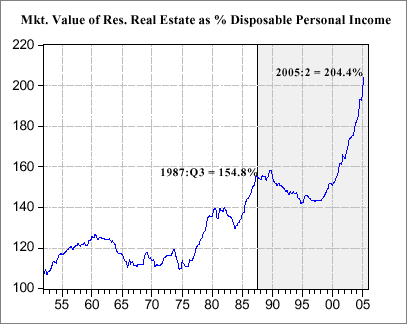 The chart above shows how banks have become extraordinarily dependent on mortgages
for their profits (total earning assets).
The chart above shows how banks have become extraordinarily dependent on mortgages
for their profits (total earning assets).
This chart depicts how housing has become the linchpin for the American homeowner: the value of housing as a percentage of disposable income has skyrocketed to--you guessed it--unprecedented heights. So let's add all this up. Bankers are making vast, unprecedented fortunes selling debt to Americans--mortgages and home equity lines of credit to homeowners, mortgage-backed securities to investors/speculators, and sky-high consumer debt to subprime/low-income consumers. Meanwhile, back at the ranch, American corporations have exploited cheap manufacturing in China to reap record levels of profits--fully 10% of the entire U.S. GDP is corporate profit. The essential ingredient in all this stupendous profiteering is, of course, the American consumer's debt and spending binging. And that's Why The Truth Can't Be Told. If Americans were told that their profligate spending is the problem, and saving more is the answer, then guess what? Fewer loans and debt equals contracting profits for banks, and more savings means contracting sales and profits for U.S. retailers, manufacturers and the entire supply chain. In other words, the profit party stops. So let's blame China instead. Here is the permanent link to this entry: Why China Is Being Scapegoated. Thank you Jonas H. ($50.00) for your unexpected and very generous donation--the first I've received from Down Under. I am greatly honored by your support. (Non-Sequitur/Footnote: the most delightful airline passenger I've ever had the pleasure of sitting next to was a young gal from Oz. Impossible not to love her, her manner of speaking, and her breezy wit.) All contributors are listed below in acknowledgement of my gratitude. If you found value here, perhaps you'd like to Your readership is greatly appreciated with or without a donation. Is This 1972 Redux--or 2000? Or Some of Both? May 19, 2007 First up: some logistics. The Readers Journal has finally been updated, and there's a wide variety of smart thinking on elites, taxes and dirt (seriously). Without healthy, living dirt, we'd all starve. And recovering soil that's been paved over is very difficult. Click on the links to your right for commentary you won't get on namby-pamby mainstream media sites or ideologically "pure" sites that "preach to the choir." Here every thoughtful opinion is welcome--Libertarian, Republican, Democratic, Anarchist, Buddhist, Taoist, Animist, you name it. (I praised Nixon here a few days ago, and you can't get more un-PC than that.) Reader Aaron O. quite rightly asked why I don't have an RSS feed for each full entry, and I need to mention that I've set up a "mirror site" on Blogspot which you can read in its entirety with Google Reader or equivalent. My apologies for not mentioning it sooner. I still hand-code an RSS and Atom summary, but if you prefer to see the whole enchilada, then switch to the Blogspot page, which I update daily. (Some charts are missing, as the formatting is funky. But you can easily click over here to see the charts.) Astute reader Matt V. posed a deeply fascinating question which I'm going to swing at (and probably whiff): While I'm writing you emails, I thought I'd bounce something off of you concerning your thoughts that we're careening toward a depression in the next decade ... Looking around I can't help but agree that these "good times" can't last forever. I'm dumbfounded how housing prices can double in a few years and everyone just accepts it as normal market forces. I keep waiting for tougher times to set in, yet somehow they have lasted without a serious recession since the 1970's. So, I'm in agreement with your writings that things aren't what they seem, and it won't last. I mean, the parallels to the 1920s is startling! However, this little voice in the back of my mind wonders if things won't turn out like anyone expects.I'm going to start my response with a chart: 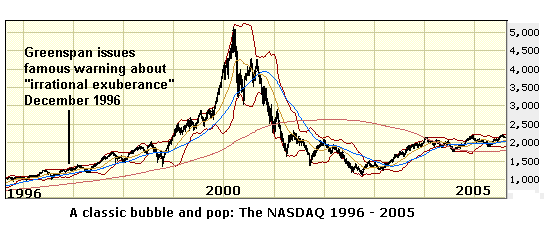
As we now know, Greenspan's warning was valid. But it took three years for the market madness to reach its final zenith. Every year that the tech euphoria continued, the chorus of doubters/naysayers grew larger. Warren Buffet famously avoided the tech sector, and ended up apologizing to his shareholders in 1999 for not matching the returns reaped by momentum players in that mad year. But the doubters were right--it just took time for a market disconnected from reality to revert to the mean, or cycle back to fundamentals. As for the current fundamentals--please scroll down to the entry of May 11, 2007 for a chilling snapshot of an economy of consumers (70% of the U.S. GDP is consuemr spending) which has been dependent on debt to fuel "prosperity." The consumer's ability to acquire and support ever more debt is clearly nearing the end of a debt-bubble cycle. The only possible outcome is reduction in borrowing/lending, reduction in spending, reduction in GDP and reduction in corporate profits which necessarily means a contraction in price-to-earnings ratios--a fancy way of saying the stock market has to tank as earnings wither. So it seems anticipating a financial return to reality (i.e. a downturn brought on by reduction of lending/borrowing) does not preclude that downturn from happening--though it is always wise to ask: what else might happen? I think the charts posted on May 11 provide little support for any other future but contraction/recession. 
Erudite reader Brian H. weighed in with a somewhat related commentary comparing 2007 with 1972: (photo is yours truly in 1972, starving philosophy student) You ever sit back and think which year 2007 is similar to?Interesting parallels. My only suggestion would be to say the stock market is like 1973, at a peak within the secular Bear market which started in 1966 (or in our era, 2000). As noted here in previous entries, this 7-year peak also occured in 1929-1936, as well as 1966-1973. Therefore history suggests the current "new market high" will be the last one for some time to come. I would also note that the 1972 "Christmas bombing" of Hanoi and the mining of Haiphong Harbor finally led the North Vietnamese to the bargaining table. Why? The U.S. had long been wary of triggering Chinese or Soviet involvement in the Vietnam War (even though Russians were piloting supposedly North Vietnamese MIG fighters) and as a result avoided hitting Hanoi or Haiphong Harbor, where a decoy Soviet freighter was always tied up to discourage any such attack. After four years of losses and political intransigence, Nixon and Kissinger finally tired of this "limited war" gamesmanship, and they made the calculation that neither China nor the U.S.S.R. would open a wider war if they went for the North Vietnamese jugular. The North Vietnamese had Soviet SAM-3 anti-air missiles, which knocked down many U.S. B-52s. But the war of attrition was won by the U.S., for with the harbor mined and the re-supply of SAMs cut off, the North Vietnamese soon expended their missiles. At that point they were in danger of losing their capital, their dikes, and whatever infrastructure was being enjoyed by the political elite. Within a matter of days, they basically sued for peace. As a further footnote, the surrender of South Vietnam two years later in 1975 might not have been as preordained as is widely perceived. For the U.S. Congress had cut off funding to the South Vietnamese, a move President Ford could not stop. Without the financial means to fund a military response to the armor (tanks) of the well-supplied North Vietnamese army, then the cut-off of funding was equivalent to surrendering South Vietnam. Was it good policy to cut off funding? Was it "worth it" to fight the war, or end it by ending financial support of South Vietnam? History can't be replayed; maybe the corrupt South Vietnamese regime was doomed, regardless of U.S. airpower or re-supply of weaponry. That is open to debate--a debate made sharper by the current political battle over ending funding of the war in Iraq. Thank you, Matt and Brian, for thought-provoking commentaries. Thank you David S. ($25.62) for your much-appreciated donation--and the explanation that it represented the Nasdaq (2562). Very clever! I now hope the Nasdaq quickly returns to 5,000! Seriously--I am greatly honored by your support. All contributors are listed below in acknowledgement of my gratitude. The Moon's a Balloon--And About to Pop May 18, 2007 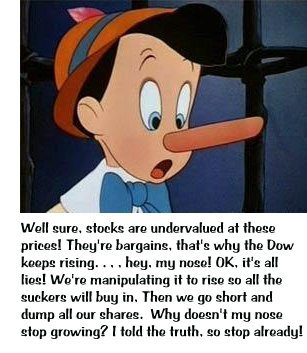
The seemingly inexorable rise in the U.S. stock indices is one of Nature's most perplexing mysteries. How does the economy weaken? Let me count the ways... housing is tanking, consumer spending is tanking, even the manipulated/phony consumer price index is rising at nearly 5% a year, gasoline is getting more expensive by the day, job "growth" is utterly bogus--but so what, the market keeps rising anyway. Ever wonder why? Well, here's your answer: so insiders can dump all their shares at the top to unsuspecting buyers who unwittingly believed the phony hype about how leveraged buyouts and the magic elixir of liquidity would support higher stock prices for the foreseeable future. Oh, and the Fed will be lowering interest rates real soon, too . . . For a view of reality as opposed to fantasy, look at the number of shares being bought by insiders (if you're an insider, and you know the stock will be rising, you buy before the public catches on) and insider sales (insiders are selling because why? They know the price will be skyrocketing soon? Hahahahaha.) My good buddy "Huevos" over at "Changos Teahouse of the Almighty" provided this summary of insider buying and selling. This metric is closely watched, because it is obvious that insiders know the prospects of their company and industry better than mere "investors"; thus if they're selling, it does not bode well for future stock market gains. In Wall Street lingo, this is called "distribution." When insiders are buying, it's called "accumulation." This is clearly distribution, on a stupendous scale.
This data makes you ask: if things are so great, why are insiders selling vast quantities of their shares and buying virtually nothing? Even in good times, insiders sell more than they buy, as stock options and grants give them "free shares" to sell. But the ratio of sells to buys is 1-to-1 or 2-to-1 in good times, not 100-to-1 or 200-to-1. Frankly, I think the "buys" in media (32,000 shares, industry-wide), Utilities (106,000 shares, industry-wide), Industrials (496,000 shares, industry-wide), transportation (250,000 shares industry-wide) and technology (1.3 million shares, industry-wide) were mistakes. An insider meant to click "sell" but accidentally clicked "buy"--a mistake that was quickly corrected. The source is Thompson Financial and the Wall Street Journal market data group. Thank you Tommy B. ($5) for your much-appreciated donation. I know it was a sacrifice for you, being a student, and I am greatly honored by your support. All contributors are listed below in acknowledgement of my gratitude. A Short Meditation on Vineyards May 17, 2007 
This California vineyard might well be in France, Chile, or Australia. Humans have cultivated grapes and made wine for thousands of years, and regardless of what other industries rise and fall, we can safely presume we will continue to nurture vineyards hundreds and even thousands of years into the future. My brother and his wife live in a small village in the Cevennes region of the south of France. As you might imagine, there are vineyards within a stone's throw of their house. On my last visit, I walked a number of kilometers down one of the many country lanes, through a small valley of vineyards and other crops. Other than the sound of motor vehicles and the paved road, the scene was probably much like it was 100 or 200 years ago, In the village, a large old building lies vacant. My brother tells me it once contained a silk factory. I knew from reading Braudel's "Civilization and Capitalism, 15th to 18th Centuries" (the three volumes listed in yesterday's entry) that France once had a thriving silk industry centered in Lyon. Tremendous wealth was generated by that industry hundreds of years ago, a boom which lasted many decades. Now virtually nothing is left of it. Might the ugly concrete tiltup buildings of Silicon Valley be torn down one day, and replaced with "higher value" orchards similar to the ones ripped out in the 1960s to make way for the tech boom? It seems improbable from our narrow decades-long view; but from the view of "civilization and capitalism" stretching out hundreds of years, then the rise and decline of entire industries and entire trading empires is the norm. I am not necessarily suggesting a "decline of civilization" or "return to agrarian poverty" in proposing such a scenario; what Braudel documents so entertainingly is how capital flows to the easiest and most profitable businesses. Thus when trade routes to India bypassed Venice and its Arab trading partners, the Venician capitalists bought land on the mainland and became wealthy agriculturalists. Thus there could be a time when the work performed in Silicon Valley has moved elsewhere, and the owners of capital realize that the value of the rich land under the concrete in a hungry world far exceeds the value of the cubicles in the buildings. Then capital will tear down Silicon Valley and plant "higher value" orchards. Silicon Valley will the be seen as a brief interruption of a much longer and more enduring agriculturally based wealth-creation. Two other issues lay just over the horizon of this bucolic image. One is that vineyards are labor-intensive. The tender care and harvesting will probably never be performed by machine, for the simple reason it will always be cheaper to hire homo sapien sapiens v1.0 than it will be to manufacture, maintain and deploy machines complex enough to trim the tendrils and snip off the bunches of grapes without damaging the plants or harvest. The other issue which is revealed by what is not visible in this photo is land use. In unbridled capitalism, these vineyards would be gone, replaced by gaudy palatial McMansions and "mini-ranches" with a little vineyard in front for show, so the wealthy social-climbing wannabes could have their quarter-acre of grapes to show off to their phony friends. Why would this happen? No matter how great the vintage, no mere vineyard can compete with $5 million cash for a relatively small plot of land. Some decry the imposition of land use on "free flow of capital." This particular corner of California is very tightly restricted by local government; you cannot plant new vineyards on slopes so steep that the erosion could damage the terrain, nor can you drill a well wherever you like and extract the precious groundwater. As a result of these "onerous" restrictions, the vineyards remain. One result of these restrictions, of course, is the value of existing homes has been driven ever upward by limited supply. But even if most of the vineyards were paved over and a 1,000 new stucco box mansions were built, the price would still be high--for in a world awash with wealth and borrowing power, a mere 1,000 mansions is nothing. The demand for "luxury property" is essentially insatiable--at least until the Great Depression of 2011 comes round. We cannot know what industry will rise or decline in the next 100 years; we can only know that industries will rise and others will decline to dust. But through it all, patient hands will be tending grape vines, and worrying about frosts, and testing acidity and sugar to decide if today is the day to harvest. Here is a clue to this particular location: RDS. Those are the initials of the local vineyard owners' group. It's obscure, but the valley itself is too well-known and too famous to be worthy of a "where is this?" If you can identify the terroir, and you'd like a signed copy of my little novel about the American road and identity, I-State Lines, I'll gladly send one to the first correct guess. There is a tiny clue buried in the paragraph above. Answer: Rutherford Dust Society . Readers Riley T., Ronald C., Steven R., Matt V., Chris S. and William S. all identified the Rutherford district of Napa Valley. Longtime reader and correspondent Riley T. was too clever for this old dog; he reports he found the answer by googling "RDS+vineyard+California." Never underestimate the Web--or the readers of this humble site. Thank you Steve A. ($5) for your most-appreciated donation. I am greatly honored by your support. All contributors are listed below in acknowledgement of my gratitude. Books: Readers' Recommendations May 16, 2007 I learn a tremendous amount from you, the readers of this humble site--from your experiences, your insights, your reasoning, and from your recommended reading. To share this wealth of ideas and sources, here is a selection of books which readers have recommended to me recently. I am a slow reader and therefore still working through the list. I have never been disappointed in a reader's suggestion. As a reminder: I post links to Amazon.com so you can access other readers' reviews of each title. If you buy a book through Amazon, I receive a sliver of a commission at no cost to you--Amazon simply shares a bit of their proceeds with me. You can often borrow these for free at a library, or find a copy used online or in a used bookstore. And I also consistently recommend buying some books at your independent bookstore, if there is one in your area. First up: frequent contributor U. Doran recently recommended a number of modern finance / economics classics, and one which may well join that select list: The Black Swan: The Impact of the Highly Improbable Extraordinary Popular Delusions and the Madness of Crowds Manias, Panics, and Crashes: A History of Financial Crises Against the Gods: The Remarkable Story of Risk Devil Take the Hindmost: A History of Financial Speculation The Great Crash 1929 The Crowd Mike D. suggested: With Speed and Violence: Why Scientists Fear Tipping Points in Climate Change Frequent contributor Michael Goodfellow recommended: China Shakes the World: A Titan's Rise and Troubled Future -- and the Challenge for America Longtime contributors Charlie R. and James C. independently recommended: The Long Emergency: Surviving the End of Oil, Climate Change, and Other Converging Catastrophes of the Twenty-First Century Erudite correspondent Riley T. recommended a 20th century classic: The Theory of the Leisure Class New correspondent Christine O. suggested two on the food chain and nutrition: The Omnivore's Dilemma: A Natural History of Four Meals Nourishing Traditions: The Cookbook that Challenges Politically Correct Nutrition and the Diet Dictocrats Longtime correspondent Cheryl A. recommended this explanation of derivatives, which I have listed before: Fiasco: The Inside Story of a Wall Street Trader For anyone wishing to improve their understanding of the stock market and their trading, frequent contributor Harun I. recommended: Reminiscences of a Stock Operator Anyone seeking to understand how global capital is deployed as a means of political and financial control would benefit from this title recommended to me by my sister: Confessions of an Economic Hit Man And I can't resist suggesting (yet again) the masterful 3-volume account of global capitalism and trading by Fernand Braudel: The Structures of Everyday Life (Volume 1) The Wheels of Commerce (Volume 2) The Perspective of the World (Volume 3) If nothing here piques your interest, check out my entire list of Recommended Books/Films. Thank you Mark K. ($10) for your generous donation via personal check. I am greatly honored by your support. All contributors are listed below in acknowledgement of my gratitude. U.S. Presidents: Two-Party Smoke and Mirrors May 15, 2007 The two greatest presidents of the 20th century were Theodore Roosevelt and. . . . hey, what a coincidence, they have the same surname! Anyone who thinks the Powers That Be hated Teddy and FDR doesn't get it. It really didn't matter that they came from different political parties; they secured the Elite's position by smoothing over the disparities which threatened to upset the peasantry enough to lead to revolt. So Teddy busted the Trusts while he built the Panama Canal and the Great White Fleet, and FDR (who served as Secretary of the Navy) saved capitalism and the Elite's power by introducing the crumbs of Social Security and the W.P.A. to keep the peasants from getting too restless and angry. The history of the Presidency is best understood as the on-going battle by the Elite to have one of their own or at least a water-carrier for the Elite in the Presidency. Teddy Roosevelt, FDR and Jack Kennedy were slam-dunks: "one of our own" in the White House. This is always the Elite's preferred solution; it makes things easier. Various pretenders to the Throne like Nelson "Rocky" Rockefeller only made it as far as the Vice Presidency, but hey, he did his duty to the nation . . . and his class. Due to the unfortunate necessity for elections, every once in a while a Cowboy--someone not of the Elite--threatens to become President. This poses a real problem, and that President has to be collared, contained and held to one term. The preferred solution is to position members of the Elite to advise the Cowboy president and keep him in line. Various politicos of either party have ably served as water-carriers, sustaining policies which maintain the Elite's domestic wealth and power. And if the U.S. can extend its global reach on that Cowboy's watch, that's fine, too, because that is ultimately an extension of the Elite's power. Local Party politico Harry Truman rose to many great challenges in his presidency--ably aided by Elite advisors like Dean Acheson. But he was never trusted by the elite, who had him replaced with General/international player Dwight Eisenhower. Cowboy Lyndon Johnson was a master of domestic Congressional politics, but way over his head internationally. Even though he retained most of Kennedy's "Whiz Kids" Elite advisors like Robert McNamara and McGeorge Bundy, he was safely shunted aside after one term. The hope that populist Elite scion Bobby Kennedy would ascend to the Presidency was cut short by another assassin. The problem for the Elite is when a Cowboy president refuses to be "guided" by Elite mandarins. Then the solution is to render him powerless, and shuffle him from office after one term in favor of an Elite or Elite-controlled president of either party. The two presidents who were uncontrolled Cowboys/Outsiders were Nixon and Carter. Here is a short list of the century's presidencies: Perhaps the most threatening Cowboy was Californian Richard Nixon. Nixon was not over his head domestically or internationally; he was a master player on the Big Board, and he took the reins at a perilous moment for the Elite: Vietnam was a quagmire, U.S. prestige was low and dropping, the anti-war movement was disruptive, the Cold War was still threatening, and rising inflation and economic malaise threatened the nation's (and thus the Elite's) wealth and power. Like Johnson, Nixon was the consummate Outsider/Cowboy/Westerner. A Cowboy ( i.e. not Northeastern elite), a Quaker, a distrustful, private man with a fanatically loyal inner circle, he placed Elites (William Rogers et. al.) in weak "show" positions outside his inner circle. His chief advisor was outsider academic superstar Henry Kissinger, in whom he recognized a kindred Big Board player. Though the Elite did not approve of Nixon--he wasn't "one of us"--they were so desperate to right the sinking ship that they swallowed their distaste and gave him their (mixed) blessing. Here are two examples of Nixon's modus operandi as a player. During the Palestinian hijacking crisis of 1970, Nixon wanted to bomb the Palestinian positions (those that could be identified) but these wishes were not carried out due to "excuses" offered by Secretary of Defense Melvin Laird. When the Israelis were in danger of losing the 1973 Yom Kippur War due to high losses of aircraft, Nixon had the 6th Fleet position aircraft carriers across the Atlantic. Limited-range A-4 Skyhawk combat aircraft were then hopped across the Atlantic to Israel, carrier to carrier, to replenish the Israeli air forces. The reinforcements enabled Israel to carry the day and overcome the Soviet-supplied air defenses of the Arab armies. This annoyed the Saudis sufficiently that they embargoed oil shipments to the U.S., triggering the "energy crisis" of 1973 and the recession of 1973-74. Nixon imposed wage and price controls at the critical juncture and worked "Shuttle diplomacy" in the Mideast with Kissinger to cool off tensions and open the flow of oil. Needless to say, the Saudis remained our "pals" despite the little "lesson" they taught us. Loathed by the Eastern Media Elite--and the entire Eastern Elite, behind closed doors--Nixon brought the messy Vietnam adventure to a costly, drawn-out close--but a close nontheless, and managed to pull together a "detente" which consolidated the U.S. position at the expense of the Soviets. By triangulating with China and limiting Soviet ambitions with the SALT I treaty, Nixon planted the seeds of the USSR's decline and ultimate failure, and the rise of China as a U.S. trading partner. The Elites should have been delighted, but since he wasn't "one of us," he was never trusted. Reagan went on to mobilize his "Silent Majority," and many of Nixon's domestic innovations--block grants to state and local governments, for instance--were eventually recognized as good policy. In other words, like him or not, he was a Big Board player. The Elite was never comfortable with Nixon, however, and so his demise was no surprise. The more amenable water-carrier Gerald Ford was ushered in, with Elite "Rocky" Rockefeller as backup in case Ford was knocked out of office (he survived two assassination attempts). I can hear the protests: what about Watergate? Nixon was a crook! Um, have you examined the obstruction of justice which has occurred in the current administration? Do you honestly think it's mere coincidence that Nixon's crimes (as Chairman Mao so aptly put it, "All Americans play with tape recorders") were splashed across page one day after day, while the crimes of this administration are mentioned on page A-17, if at all? Why is that? My thesis is: Bush is a coddled (incompetence is tolerated) scion of the Elite, a leader who is very adept at persuading the peasantry to fall on their swords to defend the interests of the Elite; therefore, he will be protected. Nixon was an Outsider/Cowboy, and his demise was therefore welcomed/abetted. The sad irony is the very peasants who voted so enthusiastically for "values-based" Bush are the very peasants who will soon be bankrupted debt-serfs reduced to abject poverty by the policies of this administration. Meanwhile the President's cronies and pals will be living in unimaginable wealth, paying few if any taxes while their kids get plum positions of power--anything but military service, because, well, all that duty-honor-country crap is for peasants. If you think I'm exaggerating, or merely indulging in "class warfare," you need to get out more--say, to Kailua-Kona Airport on the Big Island of Hawaii, an airport and area I know well, where the private $80 million jets are so numerous they're seriously overcrowding the tarmac. Homes in the $20 million range are as common as lava on the coast. In sum: the "party affiliation" of the candidate is utterly meaningless. That "show" is the Coliseum entertainment of talk-show tirades and a lot of hooey about "values" to distract the peasants from noticing how they're serving the interests of the Elite. So who will meet with the EMEGD's approval? Hillary Clinton: Yes. Has shown she's a willing water-carrier for the Elite, fundamentally an Elite wannabe like her husband. Will toe the line in all important matters and will staff her administration with Insiders and Elites. Obama. Yes. Product of an elite prep school (same one I graduated from, Punahou School, hahaha), well-versed in "safe" liberal positions which don't fundamentally threaten the Elites wealth or reach, the consummate "American success story" and "trustworthy African-American" who will also staff his administration with safely Elite "liberal" advisors. McCain: No. Classic Cowboy, Westerner, non-elite, wild-card "loose cannon" who can't be trusted to carry water consistently for the Elite. Adamantly no. Giuliani. Maybe, but far from first choice. No evidence he'll be guided/advised by Elites, so why gamble? Milt Romney: No. Religious element is untrustworthy; Elites are not interested in guessing who you will be once in office. Ron Paul, Dennis Kucinich: No way. Dangerously Outsider, both support ideas which could undermine the domestic wealth and power of the Elite. No, no, a thousand times no. But what about all the "differences" between the parties? I hate to disillusion you, but here's how national healthcare will work: when the Elites' interests start getting squeezed, either by a peasant revolt or a reduction in profits and power, then a national plan will suddenly be hurried into law, over the objections of various entrenched interests who had successfully held it at bay for years (the AMA, etc.) The main feature of the Plan will be that it is supported by taxes on wage-earners. Therefore its passage will have zero effect on the Elite, except in one way: by freeing corporations of the burden of providing health insurance, the Plan will increase corprorate profits. Like all products which serve the Elites, it will be packaged as a "non-partisan" bill that everyone can claim credit for. The peasantry will glance up from their entertainment and give a hearty cheer, somehow missing that the burden of paying for the plan falls to them, not the Elite. Oh, and please don't tell me the canard about how the wealthy pay most of the taxes. The "wealthy" wage earners pay most of the taxes, but the truly wealthy (those with hundreds of millions in assets) pay little or nothing, because there are innumerable ways for them to avoid all taxes--ways we peasants cannot even grasp (interest rate swaps, offshore holding companies, and the like). A truly fair tax would be a percentage of all assets, including all assets held overseas and in tax-free bonds. Failure to comply would mean not a slap on the wrist but revocation of your citizenship (for starters) and criminal charges akin to money-laundering by gangsters--in other words, grounds to freeze accounts. This would collect a "fair share" of wealth from those who evade income taxes. Is such a plan even feasible? Don't make me laugh. The Elites go to a lot of trouble to control the poltical process, and the last thing they will ever allow is an asset-based tax because, duh, they'd have to pay something! Some of you may be surprised that I would lump a radical Libertarian (Ron Paul) with a radical Liberal (Dennis Kucinich) but in my view, they are cut from the same cloth: outsiders who are feared by the EMEGD. I would support either one, because either one would be sure to upset the apple cart in favor of the peasants. Thank you David C. ($50) for your unexpectedly generous donation. I am greatly honored by your support. All contributors are listed below in acknowledgement of my gratitude. Going to War with the Political Elite You Have May 14, 2007 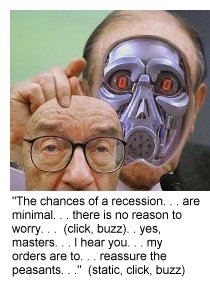 To paraphrase the recently departed Secretary of Defense: "You go to war with the political
elite you have. They're not the elite you might want or wish to have at a later time, but
as you know, it's always the same elite."
To paraphrase the recently departed Secretary of Defense: "You go to war with the political
elite you have. They're not the elite you might want or wish to have at a later time, but
as you know, it's always the same elite."
Wait--what did you just say? Let's consider this thesis: The "two-party system" is a travesty of a mockery of a sham, a con perpetrated for the consumption of the peasantry. I am a peasant, so I say this without irony. It is not demeaning, it is reality. What makes me a peasant? Do I own sufficient means of production or capital to live well without labor? No. Do I owe a vast sum of money? Yes. Do I pay more tax than a hedge fund manager who "earned" $360 million? Yes. (When the 15% FICA self-employment tax has no ceiling, and 15% of that $360 million goes to FICA, let me know--but don't hold your breath.) Am I politically powerless? Yes. I could go on, but you get the idea. The actual political structure of the U.S.A. has roughly three moving parts: the Elite Maintaining and Extending Global Dominance (EMEGD), The Cowboys, and the peasantry/debt-serfs/occasionally-voters. Most people don't understand the structure of the Elite because it's complicated. One of my old and dear friends earned a doctorate in cell biology at UCSF, and she had a poster depicting the immune systems' dozens of interacting cells. The Elite is very much like the immune system: very complex, with hundreds of moving parts which interact on various levels to maintain the organism--in this case, the United States' global dominance. 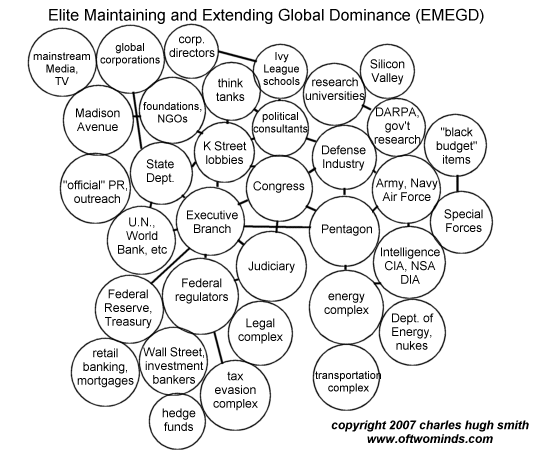
At a very superficial level, some pundits have sought a Master Control in the Trilateral Commission or similar elite gatherings. Such groups are certainly one cell within the EMEGD, but each is no more important than other parts, just as killer T-cells are just one of dozens of cell types in the immune system. To be a part of the Elite, you need only be willing to carry water for one of the essential power structures. Many technocrats are members of the Elite, and they are rewarded with positions like Under Secretary of the Treasury or Assistant Deputy Attorney General or Deputy Director of the C.I.A. and the like. Elites are also woven into the world of corporate interlocking-directories, where someone "liberal" like Hillary Clinton sat on the board of rabidly anti-union Wal-Mart for years. Conflict of interest? Are you kidding? You want to be a Player, you carry water whenever and wherever you have to. To be a power player, though, you need connections, which are most easily gained via a "good birth" and all that follows from that: elite prep schools, elite universities, powerful mentors, plum positions as first jobs, and so on. Power and money are often confused as being one and the same. They are not. Andrew Carnegie was immensely wealthy, but he was not a player. He was a safely apolitical "do-gooder," just as Warren Buffet and Bill Gates are safe little "do-gooders," giving PCs to libraries and funds to eradicate nasty diseases. Now if Bill Gates were to give $100 milion to Ron Paul's campaign for Presidency, he would immediately become a threat, and moves would be made to bring him round or undermine his ability to influence matters of actual importance to EMEGD. Put simply: $100 million spent relieving pain and suffering makes you a harmless do-gooder. Spending $100 million to buy some seats in Congress makes you potentially dangerous. But most people with that kind of wealth are securely in the Elite, because their wealth ultimately flows from MEGD--the global dominance of the U.S. which ensures a market for their products and services, and guarantees access to emerging markets. Another hopelessly naive view of the EMEGD is to see global corporations as the ultimate Power Behind the Throne. This is as misguided as thinking macrophages are the entire immune system. It isn't that simple. Sure, corporations provide donations and soft power, but they're just one node. To say that corporations led the U.S. into war in Korea or Vietnam is just plain wrong, and reveals how simplistic reductions of EMEGD are inevitably misleading. In the Big Picture, Microsoft, IBM, Coke, et. al. are bit players in the Game of Global Dominance. At the top level, the game is going very well for the U.S., despite the "bad press" and all that nonsense about the Decline of Rome. China has been brought into the game, and is a key supporter of U.S. global dominance. Sure, we let them have the Olympics--a real money-pit--but basically the deal all goes "our" way: in exchange for a 100 million jobs, which keeps their peasantry in line and enables the Communist Party Elite to maintain and extend their power, then China buys all the worthless money we print, enabling the U.S. to print off $1 trillion to pay for the Iraqi adventure with virtually no sacrifice required by U.S. peasants (except those in the military) or the elite's interests. Can you believe what a sweet deal this is for our Elite? The Chinese take on all the risk of a dollar collapse for a lousy 4% interest, and they also accept all the industrial pollution. Since they were pressured into allowing foreign ownership, Western corporations have been minting profits in the hundreds of billions by making stuff in China. In exchange, China gets the jobs--at least until the recession kicks in, or the factories move on to Vietnam and Africa. Some naive souls expect China's own middle-class to support its industry. Nice fantasy, but the reality is the U.S. consumer is 20% of global GDP, and the 25 million truly middle-class Chinese are less than 1%. When it all blows over, what is China left with? An oil-rich neighbor to the north (Russia) which is hardly a close ally, U.S. allies or trading partners to the south (Communist Vietnam would love to poach some industry from their Communist "friends" to the north), an Islamic hotbed to the West currently being subdued by the U.S., and to the East, a resurgent Japan and the wealthy island state of Taiwan, which the U.S. may or may not defend but which already owns a big piece of the mainland. The U.S. plays coy about defending Taiwan because, well, that's in "our" interest. If we decide it's not worth it, then we abandon Taiwan, just as we did the Kurds and many other suckers who believed our promises. But if it's in the interests of Global Domination to defend Taiwan, well, China better be careful. The smart play is often ambiguity, because the other side has to guess--and they know they might guess wrong. If you think a "Democratic" president isn't going to approve the development of a new family of smaller, more "practical" nuclear weapons--prepare to be disillusioned. The Chinese maintain about 100 long-range nuclear-armed missiles for "deterrent." Not a bad idea. The U.S. maintains several thousand strategic nuclear weapons and thousands more tactical (battlefield) weapons. To quote from my January 30 entry Vulnerability, or, Thinking About the Unthinkable: Just for comparison's sake: The U.S. maintains 18 "boomers" (Ohio-Class Fleet Ballistic Missile Submarines--SSBNs), each armed with 24 D-5 Trident missiles, which are each armed with 5 independently targetable warheads (MIRVs). Each U.S. SSBN thus carries 120 nuclear warheads, launched within one minute and deliverable anywhere in the world. That's 2,160 nuclear warheads distributed among 18 very-hard-to-locate boats. Not all are at sea at any one time, but catching a few in dock would still leave 1,500 or so nuclear weapons available for a counter-stike. What nation would chance absorbing even one SSBN's load of 120 nuclear bombs?Most of China's wealth is concentrated in a narrow band along the coast. Just one "warning" nuke on the Three Gorges Dam would do more harm than the Chinese nation could possibly afford. If you don't believe the U.S. would deploy nukes if "our interests" were at stake, I can only quote The Mogambo Guru: hahahahaha. Sure, it's "only" military power. And yes, the U.S. is vulnerable to nuclear attack, too. But if push comes to shove, which military would you rather own? Ditto for energy. Those without a thorough understanding of global reach are beating the drums about China's forays into Africa, but this is a sign of weakness, not strength. The U.S. has Mexico and the Mid-East wrapped up, so Africa is the only game left to the Chinese (and most of the big oil fields in Africa like Nigeria are wrapped up as well). They've played there before, with zero success. Back in the Cultural Revolution days of solidarity masking global ambitions, the Chinese built entire railways in Africa. And what did they get out of it, long-term? Zip, nada, zero. So while the U.S. controls the big oil fields of Nigeria, the Chinese are forced to gamble for influence with the most treacherous, most hated regime on the planet, Sudan, for a few million barrels of oil. Are they buying access, buying allies, or really supplanting the West? Time will tell, but the history of the past 50 years suggests political turmoil at home will reel in global ambitions and adventures fast. EMEGD takes a long view. Sure, Chavez in Venezuela nationalized oil and is trying to build an alternative power structure, but he is, after all, limited to one lifetime. Like his mentor Castro who is dying, any dictator/despot/wonderful hero can only last a few decades. Once he's gone (or overthrown), then the EMEGD can "support responsible alternatives." Consider India. After jettisoning its ill-advised and ultimately worthless alliance with the defunct USSR, India is now a new U.S. ally--and in exchange for that alliance, the U.S. just slapped their wrist for getting nukes. And what does the U.S. get out of it? Nukes aimed at Pakistan, should that country ever threaten U.S. dominance, and a huge source of talent for U.S. global corporations, and new markets for U.S, goods. Oreos and hip-hop, baby. The dominance is on all fronts. You might have thought it was a joke when U.S. troops played Jimi Hendrix's "Voodoo Child" over the loudspeakers to freak out General Noreiga, who was on his way out as frontman of Panama--that was no joke. Rock-n-roll and hip-hop are the "cultural shock troops" of U.S. domination--which is domination not just of financial and military assets, but of mindshare and cultural values. Think about it: what has Germany, Japan or China "occupied" in mindshare in the global space? Hello Kitty, manga and. . . zip. Sure, dilettantes love War Kung-Wai, but on a global stage . . , have you seen a Bollywood film recently? The moves are hip-hop, the look pure Hollywood knock-off. The guy gets off the helicopter in shades and a three-day beard . . . On to Iraq, where the Grand Strategy is playing out to the long-range benefit of the U.S., even if the actual war was botched by an incompetent administration and the U.S. military is suffering from the strain. But hey, EMEGD plays a long-term game--did you notice those U.S. Military bases in Japan and Germany, 60 years after the war ended?--and a couple thousand KIA a year is no big deal--it's not their kids dying, after all, and besides, a little war trains a new officer corps and allows the "fighting spirit" of the U.S. an outlet. For if there's one thing the Elite understands, it's that the U.S. population is feisty and doesn't mind mixing it up when challenged. The Germans and the Japanese really didn't read the U.S. character well (i.e. "a nation of mongrels") and ironically, their challenging the U.S. enabled the U.S. to dominate both Europe and the Pacific for the duration. My own father told me he bought two used cars as a senior in high school because he figured he would die in World War II (he enlisted in the Navy right out of high school in 1944) and he reckoned there was no point in saving his wages. His brother served as a gunner in the 8th Air Force, which suffered combat losses of about 50%--yes, half the guys died. This was only exceeded by submariners in the Pacific. If you imagine sacrifice and bravery ended in WWII, you probably don't know any 'Nam vets or people who have served in the Gulf Wars. Despite the horrific personal losses suffered in Korea and Vietnam, those "holding actions" didn't dim the nation's willingness to fight. So allow me to predict the end-state of the Iraqi war: the U.S. will maintain bases deep in the desert near the Iranian and Syrian borders, and maintain close ties with the Kurds (despite our abject betrayal in 1991, we're still the only game in town). Much of the personnel will be Special Forces or equivalent (Rangers, elite Marine or Navy units, etc.) The bases will soon be forgotten because they're so isolated, no hopeful suicide-bomber can even get to close them. They'll be there for "goodwill" like all those missions in Africa you don't know about, and to remind the Iranians and Syrians that there are limits to what will be tolerated. We have to take a broad view when we read about "Imperial over-stretch." The U.S. maintains 11 carrier strike groups (CSG), while the entire rest of the planet maintains four--three British and one French. (Neither military should be taken lightly. Did I mention they're U.S. allies?) India bought a defective Soviet carrier which may never put to sea, and the Chinese have aspirations, but as of now, all carries task groups are U.S. or U.S. allies. Does a carrier task force solve Iraq? No. Does it resolve political dilemmas? No. But it does project power, which separates nations into two groups: those who can and those who can't. Regardless of the party, Republican or Democrat, any reduction in U.S. military force will be resisted by the Elite. Chairman Mao rather famously said, "Political power comes from the barrel of a gun," and the U.S. Elite very firmly agrees. Here is what will mark Imperial decline: a volunteer U.S. Military of 25,000 hardy souls, and an army of 450,000 mercenaries. We aren't there yet, so all predictions of U.S. decline are premature. When we're all dancing to Chinese New Wave music and eating Chinese cookies and practising New Taoism (having left the Baptists), then the U.S. "hegemony" will be over. But it isn't over yet, nor is that decline in the cards. For the EMEGD have resources beyond what the Islamic Revolutionaries or the New Russians or the Chinese Communist Party can even dream of. $1 trillion spent on a foreign war? No big deal. 11 carrier battle groups? No big deal. 10,000 nukes? No big deal. The list goes on. Hip-hop. $1 billion-grossing films. Technology--iPods, blogs, Web2.0, Google, you name it. The top 500 Global Corporations: all U.S. or U.S. allies or U.S. trading partners--a group in which I place China. But in the Long View of the MEGD, there's rarely need for force. Hip-hop, KFC and Oreos are the real "shock troops" which are busily conquering Iran and Syria despite the frantic efforts of their ruling elites to muster the old tired ideologies of the past. I know this sounds like an echo of U.S. Triumphalism, but it is simply a statement of fact. This is what drives frustrated French politicians to describe the U.S. as a "hyper-power," a force so pervasive that "super-power" does not do justice to its reach. If you research the U.S. military's presence in Africa--often a "goodwill" presence of medics--you will understand a tiny bit of the reach. To play a little game to put things in perspective: which reins of leadership which would you want: Russia (declining in population, ruled by gangster capitalism, relying on declining oil reserves for its wealth), China (massive systemic corruption, widespread social unrest, horrendous pollution, huge unfunded social costs, heavy reliance on sales of manufactured goods to the West and Western investment, massive understated bad debts in the public banking sector, etc.) or the U.S.? Yes, the U.S. has a laundry list of huge problems, too--but be honest. Which set of conditions, strengths and problems would you prefer to own? Yes, I anticipate a global recession, a decline in the dollar, and much suffering as a result of both. But to say the "hyper-power" is suddenly toothless and reduced to "only" military force--a skeptic has a hard time accepting such "politically-correct" views. Yes, there will be terrible costs to the U.S.--but these will be borne by the peasantry/debt-serfs, not the Elite--and therein lies the "universal truth" of the coming recession--in every nation. One window into the Elite is the U.S. Presidency. Once you understand how it works, you realise just how illusory the two-party system really is. But that's the topic for tomorrow. Thank you Joshua B. ($7, second donation) for your unexpected and generous donation. Joshua, my email "thank you" to you was returned--please email me from another account. I am greatly honored by your continuing support. All contributors are listed below in acknowledgement of my gratitude. Don't Cough May 12, 2007 If you will forgive a moment of sophomoric humor, please read this joke: The owner of a drug store walks in to find a guy leaning heavily against wall. The owner asks the clerk, "What's with that guy over there by the wall?"I humbly submit this is a perfect metaphor for the U.S. stock market and indeed, the entire U.S. economy: don't cough, or the fresh manure will hit the circular spinning air movement device. It is almost laughable how former Federal Reserve Greenspan is trotted out after every modest dip in the stock market--regardless of where he might be on the planet--to dutifully reassure us peasants that a recession is unlikely, despite the overwhelming evidence that a prolonged recession lies just ahead. The laxative which has been administered in excess is credit, and the unfortunate consequence is excessive borrowing and the misallocation of that borrowed capital on leveraged buyouts, re-purchase of shares (which generates no new products, services or jobs), energy-wasting McMansions and an astonishing array of largely underutilized or just plain worthless consumerist gew-gaws (please see the Readers Journal entry by James C. this week for elucidation). But enough of tasteless metaphors. Let's look at a chart of the fabulous, ever-rising, never-will-decline-again Nasdaq--which looks like it can't hold back a good hard cough much longer: 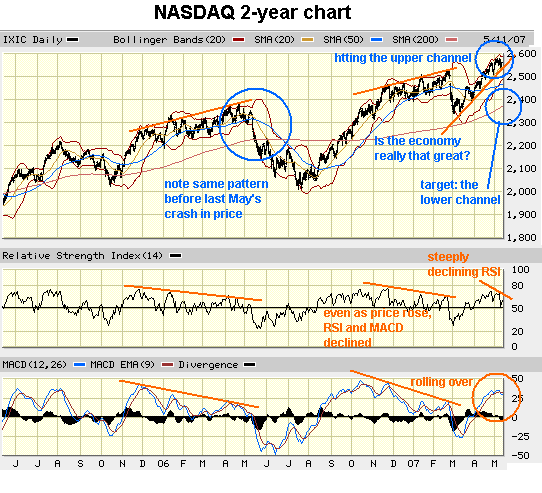
Note the similarity between the divergence between price and RSI/MACD which presaged last May's sharp decline in the market and the past few month's divergences. It's just a guess, but based on this chart, it sure looks like Nasdaq's long-suppressed cough may come, depsite Greenspan's plea for continued complacency. Check out the new entry in This Week's Readers Journal by Matt L. on national health insurance and "baseline-plus" services: Your entries on health care and the two reader responses you posted got me thinking again (As your site always does). I see at least two additional reasons why national health care is a good thing." (more) Thank you M.C. ($5) for your generous donation. I am greatly honored by your support. All contributors are listed below in acknowledgement of my gratitude. Housing Affordability: Crushed by Debt May 11, 2007 Yesterday we considered the possibility that interest rates might rise for the next 15-20 years, effectively lowering the value of housing with each tick upward. Today let's consider affordability in terms of the percentage of household income which "should" go toward housing. 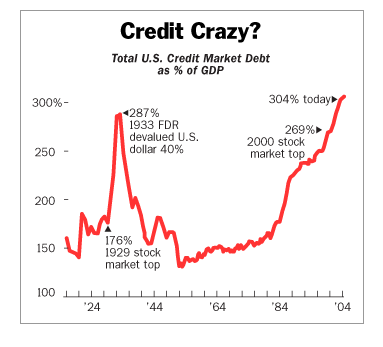
Back in the good old days, the calculation was simple: your mortgage payment shouldn't be more than a quarter of your gross income. This was also a simple calculation because few people had revolving credit or any debt other than a car payment. No credit cards? You're kidding, right? I recall rather vividly the year my Mom started to complain about her Mastercharge bill (as Mastercard was called back then)--1968. Prior to that, a business type might have a Diners Card, which was not revolving credit but a charge card like American Express which had to be paid off monthly. 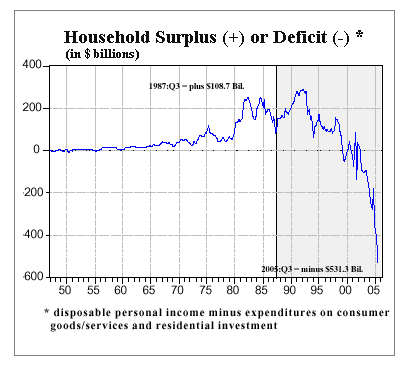
Sure, you might have had a Sears card, but the credit limit was $200--enough for a new washing machine or table saw and not much else. Credit was issued sparingly, and used sparingly. The typical limit on revolving credit was perhaps $1,000 or at most $2,000 in today's (depreciated) dollars--$500 was a big limit. Now just about all of us receive $20,000 credit-limit card offers every week. Student loans? Nonexistent. Now people are still paying off student loans in their 40s, with their kids' college just a few years away. Talk about becoming debt serfs. Take a look at this chart and notice that deficit spending (living off borrowed money) has been the order of the day, violating decades-long trends of fiscal prudence. Frequent contributor Harun I. provided this insightful commentary on the topic: (emphasis added by me) I like to run and bike ride. As I ride and run through neighborhoods and look at the local real estate rag the whole affordability question has been nagging me. Anything listed at your modest $250,000 is a shack I wouldn't want Ned-the-wino to live in and yet people are buying homes $300,000 and up like everything is okay. 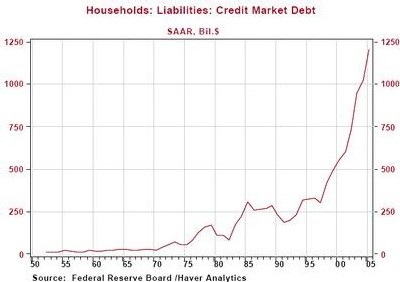
As I write this Thursday, the stock market is down due to the "surprising decline" in retail sales. Meanwhile, the market was up just days ago on the "surprising rise" in consumer debt. No need to connect the dots--they're so close they're touching. As these charts show, consumers have been living off borrowed money for years; household debt has leaped. As an exercise, let's take the median household income of about $45,000 and see how much house that supports in a traditional (i.e. prudent) setting. If we account for principal as well as simple interest, then a mortgage of about $180,000 looks do-able. 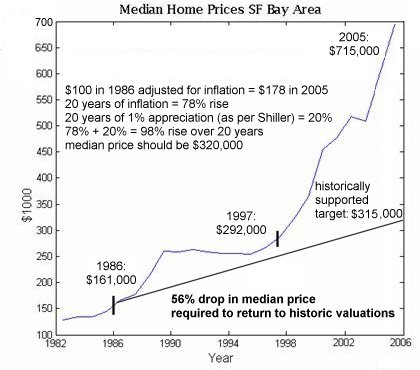
With a traditional 20% cash down payment of $45,000 (try not to laugh too hard--as if that ever happens any more) then the median household income would support buying a $225,000 house ($45K down, mortgage of $180K). The median price of a house in the U.S. is about $215,000, so on the surface things look reasonably aligned. But we all know home values on the heavily-populated coasts are much higher than $215,000, The income is higher, too, but not by as much as you might think. California's median income is about $50,000--certainly not enough to justify median house prices in the $600,000 range. If we factor in non-mortgage debt--auto loans, student loans, and credit cards--then the actual earnings left for mortgage debt service is lower than such traditional ratios as "28% of gross income" assume. Simply put: people are carrying much higher consumer debt loads than ever before, and devoting a larger share of their income to servicing that debt than ever before. The actual net income left to service mortgage debt means the actual debt-to-income ratios are far higher and far less fiscally prudent than in decades past. To repeat Harun's question: With MEW (mortgage equity withdrawal) effectively shutdown people are turning to credit cards to stay afloat but how long can that last? If you consider these charts, the answer is: not very long. Check out the new entries in This Week's Readers Journal: Fred Roper on national health insurance, Loretta N. on housing and consumer debt and Alan D. on housing and the view from Canada: Loretta N.: "I found your post today to be of particular interest. Most of my friends are in their thirties, with young children. All of them have college degrees and most are employed in "white" collar jobs. None of us live extravagantly. Yet, none of us feel like we have any money at the end of the month to save for retirement, our kids college education, etc." (more) Alan D.: "As a Canadian who visits the US frequently, I'm amazed by the following things:" (more)Also read Harun I.'s essay on The Fort Dix Terror Plot: "Cockroach theory anyone? Luckily these guys were rank amateurs and had no clue about OPSEC let alone how to run an operation like this. But even an idiot that is willing to die for a cause can be very dangerous." (more) Thank you P.S. ($10) for your generous donation. I am greatly honored by your support. All contributors are listed below in acknowledgement of my gratitude. Housing - Interest Rate See-Saw May 10, 2007 It's a given that rising supply (inventory) and slackening demand (fewer buyers) lead to price declines in any market--for instance, housing. Since interest rates fell for an entire generation (22 years) from their peak in 1981, the relationship between housing prices and interest rates has been largely forgotten or at least neglected. As interest rates rise, the "see-saw" of higher rates and dropping house values will place pricing pressure on even the most desirable housing. Here is a simple depiction of the relationship: 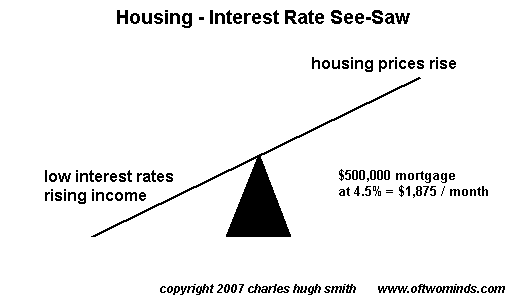

The current quasi-religious belief in "low interest rates will last forever" runs against both history and the inevitable decline of Chinese support of our low interest rates via their stupendous, unrelenting, trillion-dollar buying of our low-return Treasury bonds: 
As this chart reveals, the only reason U.S. interest rates have stayed low is the Chinese have poured virtually all of their dollar surpluses into U.S. Treasuries. Interest and mortgage rates, as I have often noted here, aren't set by the Federal Reserve, but by the market. If there is huge supply (our government selling hundreds of billions in new bonds and rolling over hundreds of billions more each year) and slackening demand (the Chinese have announced they're diversifying their holdings into other currencies), then rates will have to rise, regardless of what's happening behind closed doors in the Fed or in the U.S. housing market. History also suggests (see chart) that interest rates move in about 20-year cycles. We have clearly ended the cycle of declining rates and are just beginning a 20+ year cycle of rising rates. So what's this got to do with the value of U.S. homes? In a word: affordability. The majority of home buyers are not cash-rich foreigners seeking investment property, but working stiffs whose chief concern is "making the monthly mortgage nut." As shown on our charts, a buyer with an adjustable-rate mortgage at 4.5% was able to "afford" a $500,000 mortgage with a "monthly nut" of $1,875. (For simplicity's sake, the principal payment has not been included.) Alas, were interest rates to rise to 9%--historically, not even a high rate--then the home buyer can only afford a $250,000 mortgage payment. That means the price of the house being purchased has to drop 50%. Some 6 million homes trade hands every year. Some small percentage are purchased with cash, meaning the buyers are immune to interest rate considerations. But prices of all commodities are set on the margin. Which means the price of 100 homes in a neighborhood are set by the last house sold. Even if 99 of the homes were purchased for $500,000, the value will drop to $400,000 the moment a comparable residence in the area sells for $400,000. As interest rates rise, then the next house might sell for $350,000, the next for $300,000 and thre next for $250,000. It would only take a handful of sales to drop prices 25% - 50%, and in a much shorter period of time than the market thinks possible. In a time of declining interest rates, buyers could "afford" more house because their monthly payment stayed the same even as their mortgage rose. The reverse will work the same way, only in the opposite direction: the same payment will support a smaller mortgage, requiring sellers to lower the price of their homes to what is "affordable" to buyers. Another factor which has supported higher mortgages and monthly payments over the past 20 years has been rising income and wealth. There hasn't been a decline in consumer spending since 1991. An entire generation has grown up and matured in a "permanent" Bull Market in stocks, bonds and real estate and ever-cheaper borrowing costs. But the coming recession of 2007-2011 will very likely see incomes and wealth both decline in absolute terms. This reduction in net income will further reduce buyers' ability to finance huge mortgages at higher interest rates. As interest rates rise, bonds fall in value, and as recession cuts corporate profits, the stock market will decline as well. All these forces together will reduce buyers' perception of their wealth (the "wealth effect") and reduce the bonuses, raises and dividends which added to their income during the past 20 years of prosperity. Please see the Readers Journal for new commentary on healthcare costs from Michael S. and a new essay on the recent elections in France by correspondent/author John Kinsella. Thank you J.B. ($20) for your unexpectedly generous donation via check. I am greatly honored by your support. All contributors are listed below in acknowledgement of my gratitude. If you found value here, perhaps you'd like to Your readership is greatly appreciated with or without a donation. Risk May 9, 2007 You read a lot about risk nowadays--as in "falling risk premium" and "thirst for risk." Why is risk "falling" and why is everyone "thirsty" for more of it? To outline the global nature of the situation, let's look at a story in the May 8 Wall Street Journal: Asia Taps Thirst for Risk: Onetime Asian corporate basket cases are seeking investors, and foreigners are lining up to buy their stocks and bonds, as hedge funds and institutional investors -- many sitting on cash piles -- scour the globe for new ways to deploy their money.Allow me to summarize. Here are folks with a track record of defaulting on debt, and people are lining up to throw more money at them. Huh? The reasons why the world is "awash in cash" are numerous--the yen carry trade, the U.S. trade deficit which dumps $800 billion into foreign coffers every year, the high savings rates in Asia and Europe, etc. But this does not explain the complete abdication of caution which now characterizes global financial markets. Here is the reason in a nutshell: free money. The global money supply has grown by 18% a year for the past four years, even as global GDP growth has averaged about 4%. Clearly, money is being created a rate far exceeding actual economic growth. As a result of all this "liquidity" (cash, cash to lend, cash to borrow), then rates are low. Let's say you could borrow $1 million for $1,000 a month. Would you be tempted to do so? Hey, why not? Couldn't I just park the million in Treasuries and earn $3,300 a month? That's the "Yen Carry Trade" in a nutshell. How about buying a "spec home" with no money down, no closing fees and a monthly payment of $750? I mean, what have I got to lose? Nothing! If I can flip this house in six months, I've risked absolutely no capital and stand to pocket a hefty gain. That's the speculative housing market in a nutshell. What if someone handed you $100,000 in free gambling chips at a casino. Would you play the "safe" game of blackjack, or would you be tempted to "try your hand" at the high-risk, high-return games like roulette? Most people would feel free to "risk" some "free money" on high-risk games because the perceived risk--hey, it's not even my money! If I lose it all, so what?--is near-zero. When anything is free, it's wasted, squandered and risked without caution. Garrett Hardin's classic paper The Tragedy of the Commons, (Wikipedia entry) outlines how "the commons" of air and water become polluted--they're "free" to each individual. Those with gold-plated healthcare insurance pay nothing for every doctor's visit and every drug prescription, and lo and behold, they go often and take a staggering amount of medications. Those who pay cash for care and medications go rarely and use little. We as a people have squandered $1 trillion in Iraq and hundreds of billions of borrowed money--"free" because you don't get the interest bill--on one fiasco after another. Frequent contributor Michael Goodfellow sent in this interesting blog on Iraq and New Orleans: New Orleans Isn't Very Different from Baghdad! So how long can the global orgy of "free money" "invested" in risky bubble markets continue? That is unknown. We do know one thing: the misallocation of so much capital on such a stupdendous scale is setting the stage for financial losses on a scale previously unknown and currently unimaginable. We are seeing the very first tentative tremors in the inverted global debt pyramid. Here in the U.S., it's the meltdown of subprime lenders--and those who bought that risky debt. For a look at the aftermath of one subprime mortgage lender, frequent contributor U. Doran recommended this article from The New York Times: A Cross-Country Blame Game: (free registration may be required) Visitors to Ownit Mortgage Solutions’ offices here are met by an abandoned reception desk and three dying potted plants that appear to have gone months without water.For another expose on how little risk management was performed by subprime lenders, Michael Goodfellow recommended this article from The Washington Post: Pressure at Mortgage Firm Led To Mass Approval of Bad Loans. If you want to see an actual prospectus for a derivative, U. Doran kindly sent in the description of the beach-party-fun named Surf 100 AAA/AaaCPDO: A Breakthrough in Synthetic Credit Investments and this dated but still incisive report from the Brookings Institution: Somebody Turn on the Lights (November 1999). Several readers (U. Doran and Cheryl A.) recommended this piece as well: Derivatives: Glowing Revelations. Gordian Knot: Healthcare May 8, 2007 A good friend of ours recently received the news we all dread: brain tumor. A large tumor has been growing at the base of her skull for years, and now that it has reached the size of a golf ball, it finally began causing mysterious symptoms: a bothersome knee and headaches. Her experience highlights much of what is good and bad in our convoluted healthcare system. Here's the bad: her symptoms were initially blown off as stress or age-related. The orthopedic doctor who had treated her knee for a running injury realized her distress could not be caused by that long-healed injury, and sent her in for an MRI. Brain tumors are not that common, and so it's not the first thought most physicians would have regarding headaches and a knee which doesn't seem to get better. But mis-diagnosis is a real problem, and we have to ask: is overwork an issue? Are doctors being "asked" to see more patients than they can adequately care for? Are HMOs and insurance companies paying for "second and third opinions," or resisting such checks on wrong diagnoses? The good: her team of surgeons was experienced, and the 13-hour surgery was successful in removing about half of the tumor; the remaining parts were too intertwined with critical nerves to risk removing surgically. The next phase of treatment will be targeted radiation. In sum: if you need complex, risky surgery and high-tech treatment, you can get it here in the U.S. with no more than a couple week's delay. The bad: the hospital (unnamed because I have only the first-hand reports of her husband, who I know is a reliable informant, but one opinion is not enough to form a judgment). According to our friend (the husband), the hospital is overwhelmed; there are not just beggars outside, but inside the facility. An infection the week after the surgery nearly killed his wife, and it was only a visiting friend who happens to be a medical student finishing her residency who observed the signs of dangerous infection. We all know the debating points: nursing staffing have been cut back to save money, other staff doesn't care/is overwhelmed/is poorly trained--I only know that this is not a unique report within my circle of contacts. The horror list at major hospitals--not some small-town clinic, but major urban facilities where the upper-middle class go to be treated--goes on and on: wrong dosages, wrong meds, you name it. It's all academic until it's you or your spouse in bed, very ill, and you're counting on a visibly harried/uncaring staff to keep them alive (and hopefully heal them). Let's grant that medicine is a difficult field; even the best internists are left wondering what ails people with vague symptoms; there are so many possible causes and so few good data points to work with. But look at this chart, which shows that we as a nation spend a much greater amount of money per capita on healthcare than other developed nations. We have to ask: are we getting as much as we're paying for? 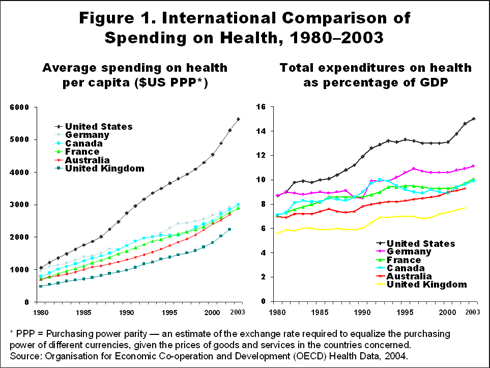
There's one more bad: the co-pay. My friend hasn't totalled up their share of the costs, because they're still rapidly spinning upward. If it wasn't for his wife's parents' savings, it would be tough to pay for the hotel and meals for the family to stay in the city to be nearby the patient--never mind the ultimate co-payment ($20,000? $30,000? $50,000?). Selling their house to pay the bills seems like a likelihood. And this of course is for a middle-class family with a job in a Fortune 500 corporation and healthcare benefits. There doesn't seem to be an end to the negative trends: skyrocketing costs and declining health and coverage. Scan just a few of the hundreds of articles outlining the issues: Annual U.S. Health Care Spending Expected To Double By 2016 To Nearly $4 trillion, CMS Report Finds The authors of the report wrote, "We are moving incrementally away from traditional sources of insurance, such as employer-based coverage, to a system comprising more federal and state government-provided health care." According to John Poisal, lead author of the report, "We will continue to face tough questions about how we finance our health care bill" as that shift occurs (Wall Street Journal, 2/21). The report did not make health care policy recommendations but warned of the possibility "that we will have to make important sacrifices to pay for health care" and of a need for "constant assessment of the value we associate with our health care investment".National Medical Spending Attributable To Overweight And Obesity: How Much, And Who’s Paying? Roland Sturm used regression analysis to show that obese adults incur annual medical expenditures that are 36 percent higher than those of normal weight incur. This analysis, however, was limited to people under age sixty-five. People age sixty-five and older now account for roughly one-fourth of the obese population, and, because of the chronic nature of obesity-attributable diseases, medical spending for treating elderly obese people is likely to be much higher than spending for nonelderly obese people.Annual estimate of retiree health care costs up nearly 8 percent: Rising health care costs are eating up more of retirees' savings, with a 65-year-old couple retiring this year needing about $215,000 to cover medical costs after they stop working, Fidelity Investments said Tuesday.  Health consequences of inactivity:
Health consequences of inactivity:
So what's the solution? Let's start with what any solution must include: 1. Portability. Benefits can't be dependent on employers; workers need to know their benefits travel with them to new jobs. Otherwise, labor markets are skewed away from opportunity to retaining benefits. 2. An emphasis on cost-cutting via patient lifestyle and diet changes, not cutting care. The primary cause of many illnesses is well-known: an unhealthy junk-food diet, and lack of exercise. The answer is simple: we must take responsibility for our own health. No one can predict who might be struck down by a brain tumor, but let's face reality on diseases like type 2 diabetes, which simply didn't exist 40 years ago, and coronary diseases caused by sloppy diets and sedentary lifestyles. 3. A competitive environment of providers, for without this there is no pricing pressure and no incentives to provide first-rate care. Ultimately, when hospitals in India and Thailand are siphoning off enough patients for lucrative surgeries ($100,000 in the U.S., $9,000 overseas with the same or better quality of staffing and facilities) then perhaps some changes which were once "unthinkable" will become very thinkable. I have long touted Kaiser Permanente as a non-profit HMO model which is scaled for national care and which has a 50+ year history. If there were even a half-dozen such providers competing with each other, that would constitute a pretty competitive environment for care and cost-cutting. If we eliminated the welter of insurance types and paperwork (which consumes an estimated 30% of our total "healthcare" spending), then we'd free up money for actual care rather than paperwork. There will be hundreds of thousands of jobs lost if the healthcare industry were streamlined; hence the tremendous resistance to any streamlining. But the streamlining will come anyway, for once the last middle-class person sells their depreciating home to pay their medical bills, and General Motors goes belly-up and reneges on its promise of lifetime medical care to its pensioners, and once the Federal Deficit soars beyond what the world is willing to subsidize, the gravy train will end regardless of who's fiddling as the city burns around us. Check out this week's Readers Journal commentaries for correspondent Fred Roper's comments on national healthcare and James C.'s observations on consumerism run amok. New essays include Protagoras' take on recent elections in the U.K. and Harun I.'s thoughtful disquisition on global imbalances. Thank you D.B. ($25) for your very unexpected and thoughtful donation. I am greatly honored by your support. All contributors are listed below in acknowledgement of my gratitude. If you want to make somebody's day (in this case, mine), then Your readership is greatly appreciated with or without a donation. Shanghai Stock Market: the Top Is Near May 7, 2007  When cookie companies are launching leveraged funds to invest in the Shanghai Composite
Index, you know the top is in. I refer of course to Kroika Cookie Company's new
"Cookie Dough Fund."
When cookie companies are launching leveraged funds to invest in the Shanghai Composite
Index, you know the top is in. I refer of course to Kroika Cookie Company's new
"Cookie Dough Fund."
As noted previously here (see the book Fiasco: The Inside Story of a Wall Street Trader But Kroika is stretching the envelope in launching an investment fund open to the public. There is even talk in Xiangxi HQ about pitching the fund on every package of cookies, along with a slogan such as "Let your fortunes rise like warm cookie dough!" (My suggestion.) Long-time readers know Kroika is a "secret" sponsor of this site, paying me big bucks to mention their products in an "authentic" fashion, such as: if you're going to buy a high-fat, high-sugar, high-salt hydrogenated-oil death-bomb anyway, then by all means indulge in a package of Kroika! cookies. (Bing! One grand! I love this sponsorship!) Kroika was last hyped (oops, I mean mentioned) here for its signature high-rise building, the world's tallest bamboo structure, which is currently under construction in the suburbs of Shanghai. Kroika's prospectus did give me pause. Buried in the legal mumbo-jumbo and caveats is the sobering disclosure that the fund intends on investing only in highly leveraged derivatives on the Shanghai Composite Index, which as the chart below indicates, has been on a Nasdaq-bubblelike tear since mid-2005: 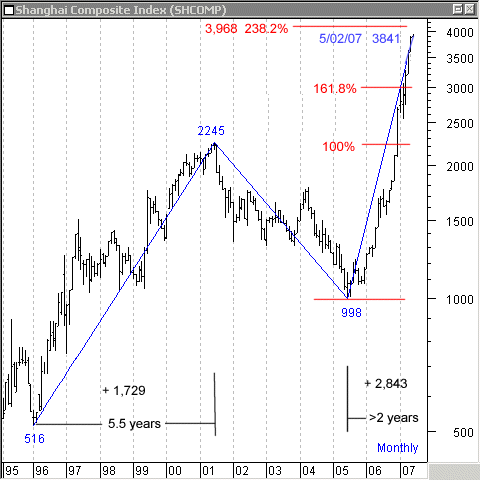
I have indicated the Fibonacci numbers of its current climb to the stars; having blown past previous levels, it is now approaching a fibo just below the 4,000 mark. If the Index reaches that close, it may well push over 4,000, as these round-number levels act as attractors. How sustainable is such a rise? One place to start an analysis is to look at the previous big run-up, which rose 1,729 points over 5.5 years. The current run has added 2,843 points to the index in less than 2 years. Does this look a tad frothy to you? It looks normal to the intrepid fund managers Kroika has hired. They're undoubtedly bright, but should 19-year olds be playing with millions? The lead manager is a 19-year old economics studen with a hot hand trading the Shanghai Composite; he apparently traded next semester's tuition of $430 U.S. into $100,000 in the past few months, using out-of-the-money calls and maximizing margin debt. His compatriots are a 22-year old female banker who quit a safe but low-paying government gig to parlay her mother's hocked gold jewelry into $200,000 last year, and a junior analyst who has not yet graduated from high school. The math whiz turned his wages from a weekend job at Kentucky Fried Chicken into $300,000 over the past two years. After a few missteps with the Scholes calcs back when he started at 16, he's generated huge profits by leveraging leverage. (Don't ask.) Lest you think this is mere farfetched parody, consider these recent articles: from the Wall Street Journal (subscription required, or check it out at the library): As Funds Leverage Up, Fears of Reckoning Rise: Hedge-fund manager John Paulson made $1 billion using a complex financial instrument to pump up a bet that the subprime-mortgage market would crater. The parent company of retail giant Sears made $74 million using a similar device to boost its wager that a basket of stocks would rise in value.And this from The Economist: The People's Republic in the Grip of Popular Capitalism; Tens of millions of Chinese are risking their shirts in a stock market frenzy. If it goes wrong, things could get nasty. WOULD-BE share punters, keen for a piece of China's booming stock market, are queuing to open accounts at a Beijing branch of China Merchants Securities. A busy manager, handing out application forms, says he is taking on 100 new clients a day, perhaps five times as many as a year ago. Bunches of small investors, ranging from students to pensioners, crowd around computer terminals to carry out their trades, keeping an eye on the prices as they flicker across big electronic screens. China's biggest-ever stock market boom may be turning into a bubble—and the country's leaders are getting worried.How much longer can such a mania last? The short answer is, "Until the last yuan of borrowed money has been invested." The other short answer is: a matter of days, a few weeks at most. Some perturbation (rising yen? U.S. market decline? Meltdown of the Turkish exchange? Fill in the blank) will upset the expectations of the leveraged punters, and a sell-off will strike with frightening fury. As the financial carnage sweeps across the globe, an investment in plain old cookie dough will start looking absolutely brilliant. Thank you A.A.L. ($15) for your very unexpected and thoughtful donation. I am greatly honored by your support. All contributors are listed below in acknowledgement of my gratitude. Readers Journal Essays May 5, 2007 Since I rashly launched this weblog two years ago today, it seemed like an appropriate moment to launch the site's latest feature: Readers Journal Essays contributed by readers like you. I owe the inspiration and concept to erudite reader Protagoras, who anticipated the high quality and wide variety of reader commentaries and essays which have already sprouted over on the Readers Journal. Just click on the "Readers Journal" logo to your right to enter the Journal's main page. From there, you can access the week's commentaries (shorter, informal comments) and the first essays. I invite you to submit either format of commentary, with the request that you avoid the sort of rude attack-language which degrades the public discourse, and any cut-and-paste of work printed elsewhere. Partisan politics and pornography (is that a redundancy?) are well-covered elsewhere on the Web so there's no point in wasting mindshare on those topics--though political analysis is welcome. What we all value, I think, is original content based on readers' own experiences, observations and thinking. Please note that while this site tends to be analytic and idea-heavy, it is also about levity, parody, garish good fun and even complete foolishness (see "Kroika! Chronicles" in the Archives), not to mention travel and multicultural experiences. I will do my best, within the constraints of my available time, to offer you both a venue for your own writing, and a variety of thoughtful and entertaining work by other readers. For data-hounds, here are a few site stats: Unique visitors visits per month June 2005: 1,402 1,856 June 2006: 13,545 33,480 April 2007: 25,175 59,780 I have no idea how this stacks up in the blogosphere, but it certainly isn't the millions garnered by Binky the Attack Pundit or Baldy the Treacherous Rabid Stock Pimp or even Pouty Girlz 24/7 Dorm Room Webcam. But somebody's stopping by, and I greatly appreciate your referrals and readership. Thank you TG. N. ($20) for your very unexpected and thoughtful donation. I am greatly honored by your support. All contributors are listed below in acknowledgement of my gratitude. Hey, if you want to celebrate the 2nd birthday of this humble outpost on the WWW and place a vote of confidence in the Readers Journal feature, then Your readership is greatly appreciated with or without a donation. Advertising, "Empowerment" and Feminism May 4, 2007 The greatest reward of hosting The American identity Literary Contest has been meeting talented young writers. Part of the fun is keeping in touch with the prize winners. In March, fiction prize-winner David Wonpu invited me down to see his play "Cool for One Night" which was staged at Santa Clara University in Silicon Valley. It was an ambitious, well-scripted semi-autobiographical play performed by student actors. I was very impressed and look forward to seeing more of David's work. Special Prize winner James Robidoux has been studying in Japan this past semester, and has promised a short report on his experiences. As someone who studied Japanese in college and who has many friends in Japan and Asia, I await his "fresh perspective" with great interest. Non-fiction prize-winner Bethan Eynon sent me this update on her studies and career aims: I graduate this June with a BS in Journalism, a minor in Sociology, and a Women's Studies Certificate. Until then, most of my energy is going toward finishing my honors thesis, in which I'm looking at the use of feminist ideology, specifically empowerment, in advertising to motivate women's consumption. My conclusion is that feminist ideology, when co-opted by marketers, is used to further a capitalist, patriarchal system that feminists actually work to subvert.If you haven't read Bethan's winning entry, I highly recommend it. You'll understand her comments once you've read her essay. If you know of a suitable job opening in journalism or Media Relations/ Communications in the private sector, let me know and I'll pass it on to Bethan. Her Senior thesis topic has been relevant for 30 years. Marketers have been exploiting "feminist empowerment" since the 70s. If you're old enough, you will recall the Virginia Slims cigarette ads, "You've come a long way, baby," which overtly suggested that killing yourself with cigarettes was a sign of empowerment. I have long admired Microsoft's ads. Their depiction of women working productively and professionally in an "Office" environment is always subtle and powerful. Take a look at a recent MSFT ad, which I have marked up very slightly: 
While I can't say for certain this is Paris, it looks like Paris--with all that "Old World" charm and promise of high-powered corporate positions and travel such a posting implies to American readers. "Smile. You're going to work." Great line, but our professionally dressed young model isn't smiling. She does, however, have the faintest Mona-Lisa-like hint of a confident upturn in her lips. Also note that she is so high-powered, she doesn't even need to carry a laptop or a briefcase. All that awaits her at the office. If this isn't empowerment, I don't know what is. The outfit, the lack of lowly corporate-world accoutrements like laptops, the poise in her walk and expression--all speak to a position at the top of the corporate game. The ad is trumpeting not just female empowerment via Office2007, but the allure and virtues of global corporate life. Actual corporate life is a series of harried trips and dull, stupifying meetings filled with pointless Powerpoint slides and "marketing targets" and the like. You don't get to walk around Paris feeling smug--you're a corporate donkey who needs to generate $5 million in sales or you're toast. Naturally, I had to subvert the ad's many subtexts. First, Mr. Softee is not about empowerment--it's about profit. (Mr. Softee is stock market slang for Microsoft, as its ticker symbol is MSFT.) And empowerment is not about your corporate office in Paris--it's being freed of the corporate treadmill entirely. Lastly, productivity is not about using software or phony "passion" for your corporate gig (which you're only using to get a better gig elsewhere)--it's about building your own business and your own life. Thank you V.K. ($5) for your very unexpected and thoughtful donation. I am greatly honored by your support. All contributors are listed below in acknowledgement of my gratitude. New feature! Readers Journal. You might have noted a slight re-design and the addition of a new feature in the top-right of this page. At the suggestion of polymath reader "Protagoras", I've launched Readers Journal as a compilation of readers comments on the week's topics, and as a home for reader's full-length essays. It would be much easier to be "assimilated" by a blog template but at this point I stubbornly prefer to forego online threads and to continue handcoding my site. My reasons are many, but the most important one is to pare the content and reader comments down to a managable size so you can read everything quickly. There are nine great comments which I heartily recommend. Instead of slogging through 172 comments as on other sites, here you get nine diverse, thoughtful views from other readers. The Paradox of Plenty III: Consumer Alienation May 3, 2007 I can tell from a drop-off in email that the Paradox of Plenty isn't striking any power chords with readers. I never know what topic will resonate, and that hit-or-miss quality is part of the fun. As models of human behavior, these are powerful concepts--but as models, perhaps they seem detached from everyday life. I'm hoping they will start resonating with readers as the global economy stumbles and then falls, and as people start looking for the underlying mechanisms which may be at work (other than greed, fear, ignorance and hope). Despite the collective yawn, I press onward to the Paradox of Plenty: Consumerism. Let's begin with a clip from today's Wall Street Journal which concedes what we all know: Americans own more crap than ever before, but this surfeit of consumer goods has not measurably increased our happiness. No Satisfaction: Why What You Have Is Never Enough: (subscription required, hopefully you can read it at your local library) We may have life and liberty. But the pursuit of happiness isn't going so well.The article goes on to state the experts' answers for why this so: we aren't designed to be happy, and we are inherently poor at forecasting the outcome of decisions which were made to increase our happiness. Fine. Let's stipulate those points. But there is another reason which won't make it onto the pages of the Wall Street Journal: the paradox of consumerism. The more you rely on acquisitions to fuel happiness, the less happiness you actually experience. Let's look at a little chart I've prepared to illustrate what we all know to be true: the more you buy, the less you actually get: 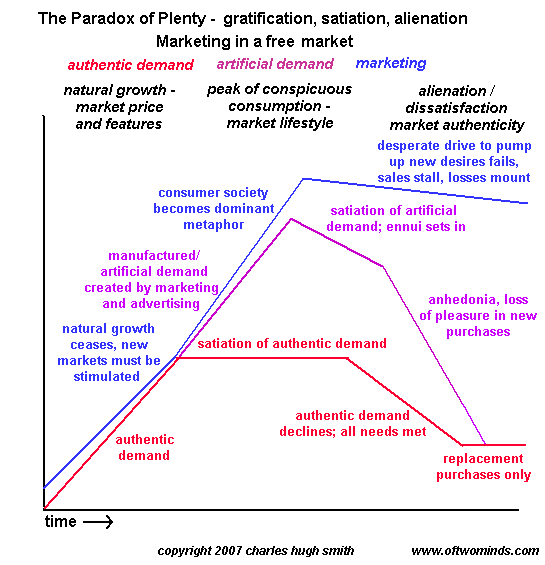
A story will help illustrate this chart. Back in the good old days of kingly wealth and power, the King was suffering from a severe bout of anhedonia (loss of pleasure, inability to enjoy). "I have everything," he moaned, "but enjoy nothing." Summoning his court Wise Man, he demanded, "I want to eat the finest meal in the land. Make it so." The Wise Man nodded politely (after all, this was his Lord and Master), and asked, "Are you willing to follow my instructions to the letter, My Lord?" The King was so disgusted with his boredom and ennui that he enthusiastically agreed. The Wise Man took the King outside, and handed him a pick and shovel. He then directed the king to dig an irrigation ditch from one end of the field to the other. Though the task was far beneath his status as ruling monarch, so degraded was the King's life and spirit that he reluctantly obeyed. After a long day toiling under the hot sun, the King's hands were blistered and a thirst and hunger he'd never experienced gripped his belly and mouth. As the setting sun touched the valley's rim, the Wise Man allowed the King to cease his ditch-digging. Beckoning the king to a nearby tree, the Wise Man then offered his master a dry crust of bread and a wooden cup of water. The King partook of this simple meal with gusto, and after finishing off the lowly bread, readily agreed with the Wise Man that this was indeed the finest meal in the kingdom. Here we have a truth which has been well and truly lost to a nation drunk with acquisition and the profit-driven "manufacture" of endless desires for more. Taking a page from Abraham Maslow's hierarchy of needs, we can describe the physiological and social needs for sustenance, shelter and civil society as "authentic" in the sense that deprivation of these basics renders any human unhappy. But alas, the profit potential in real food and modest shelter is limited. So a trillion-dollar industry attempts to instill in you a craving for sports drinks (salty sugar water), a Lexus (a Toyota with a different nameplate), a manicure (you're worth being coddled) and Special Status (you're a bigshot). But in a terrible irony, each acquisition of a new product or service provides a shorter and less intense "pay-off" of happiness. At the climax of this process, the "consumer" (at this stage, every human being has been reduced to a "consumer") has hundreds of media channels, thousands of free songs, thousands of movies, hundreds of snacks and foods, limitless choices in clothing and electronic gewgaws--and yet rather than feel a limitless joy with this cornucopia, the "consumer" feels bored and dissatisfied. This alienation from self and authenticity is the ultimate fulfillment of consumerism. That we have reached this end stage of alienation is painfully obvious in the obsession with "luxury goods" and the frenzy to shout "Look at me!" louder than anyone else. It is stating the obvious but still worth noting that those truly wealthy in happiness feel no desire to attract the attention or approval of others, nor do they suffer under the delusion that a new trinket or toy will add to their well-being. I take no pleasure in foreseeing a long, deep recession; I do not welcome it, I simply observe the causal conditions which guarantee millions will suffer financial loss and ruin. Most of you see the same causal conditions and foresee the inevitable collapse of real estate valuations and the entire bubble of debt which fueled the "boom." Putting the two together--a collapse of the financial bubble and the alienation of the "consumer"--I predict the next wave of marketing will be aimed at "authenticity." As millions of once-middle class citizens find themselves struggling under mountains of debt they can never pay off, as they grasp the fundamental emptiness of their McMansion and Lexus and iPod (assuming they're able to keep them), then their anger at those who benefitted from the "boom" (such as hedge fund managers who raked in $300 million a year each) will grow to a white-hot fury, and marketers, PR hacks and advertising gurus will be running away from "luxury," "status" and "lifestyle" and toward "authentic" themes and labels. The worst time to ask for donations is after a downbeat diatribe, so it gives me a perverse pleasure to do just that... hey, how about supporting a purveyor of anhedonia and alienation? Your readership is greatly appreciated with or without a donation. The Paradox of Plenty II: Manufacturing May 2, 2007 Yesterday we looked at the paradox of plenty in resources: as supply (of fish, oil, etc.) rises with new extraction/harvesting technologies, prices drop and vast quantities of the resources are squandered in the mistaken view that it will be abundant forever. With prices low, there is no market incentive to conserve or even look at the non-market costs such as species extinction. (The market doesn't care if you dynamite the reefs to harvest the fish or poison the water to extract the gold.) While you may think there is no "paradox of plenty" in manufactured goods--supply will always be tailored to match demand--there is indeed a paradox in manufacturing as well. As production ramps up to meet new demand, new producers join the frenzy. As demand slackens, the industry has too much capacity. Prices drop but this doesn't boost demand. Profits turn into losses and producers go bankrupt or are acquired, leaving either a monopoly or a cartel. 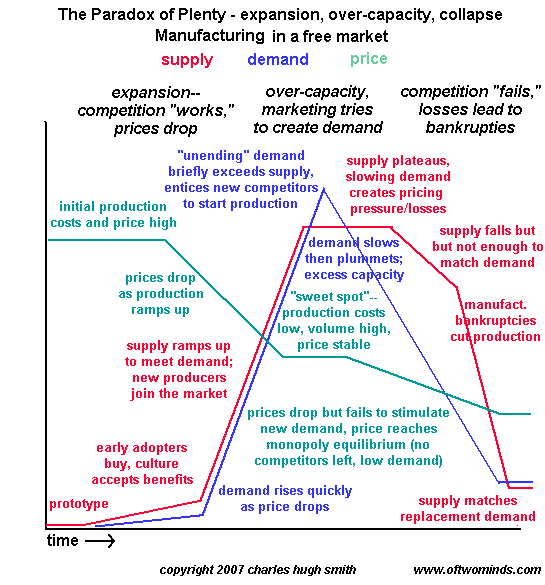
Of course some companies excel at creating products which are unique and therefore the price can be maintained at a high level--Apple and the iPod, for instance. But eventually either demand for iPods will be satiated or competitors will match its "cool" factor and over-capacity will emerge. In industries like steel, there isn't much to differentiate manufacturers, and so these industries are especially vulnerable to over-capacity and collapse of profits. Take at look at this graph of China's skyrocketing steel production capacity: 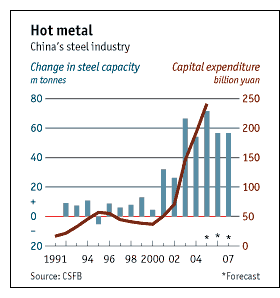
China is adding steel mills as if the demand will keep climbing at a permanently high rate. But where the demand rose quickly from 10 million tons to 20 million tons, the rise from 50 million tons to 60 million tons is much slower. At some point, demand for additional steel will top out, even in China. But as this chart demonstrates, capacity is being added at a tremendous rate--to meet a future demand which will not exist. Once over-capacity is a reality, then the producers enter the no-win tailspin of lowering production and cutting prices as each tries to grab market share and stay afloat. Eventually, weaker hands fold and are bought out, or shuttered and the production idled. As I have reported before, this has already come to pass in China in CRT televisions--a story reported in China Daily back in 2000. TV manufacturers were making more TV sets than the market could absorb, and price cuts had led to steep losses. The government had been forced to step in and fix prices. The same cycle is setting up in flat-screen televisions now, with manufacturers in Korea, Japan and China ramping up huge capacity to produce a "permanent abundance" of flat-screen TVs--an abundance which at some point will far exceed demand. Some industries have detoured this fate by creating "product cycles" in which the latest mobile-phone gimmicks (oops, I mean "features") spur new demand; and the auto industry has set up just such a replacement cycle as gas-hog vehicles will eventually have to be replaced by hybrids. But even industries which has prospered on ever-faster "product cycles" may find an exhaustion of demand as the global economy weakens. Consumers will realize the features on their current phone exceed their needs, and their Focus or Camry still has plenty of life left in it. Then the over-capacity being built in the global auto industry will suddenly become painfully visible--at least to the workers at plants which will be shuttered. So what's the paradox of plenty here? Over-capacity creates abundance, but also guarantees prices dropping below costs, leading to a collapse of profits and producers. In the euphoria of giant new markets like China, it's easy to be swept up and not notice that the cycle exists even in China, where the manufacturing sector is so prodigious that it can exceed global demand for virtually any product. The Paradox of Plenty I: Resources May 1, 2007 Let's explore the "paradox of plenty," of which there are many, in the next few days. I hope you'll find the concept as fascinating as I do. Interestingly, there are three different books with this title, and all address entirely different paradoxes of plenty. The first, The Paradox of Plenty: Oil Booms and Petro-States The reasons are many, including poor governance (kleptocracies, dictatorships, oligarchies, "dictatorships of the proletariat" etc.) and human nature ("we're rich, it's unlimited, let's hire other people to take care of us"). The next two address paradoxes inherent in food. Paradox of Plenty: A Social History of Eating in Modern America Levenstein explores the disturbing existence of hunger in the midst of agricultural abundance. Describing the economic, political, and cultural factors that have influenced the American diet, he exposes the role that major food processors, the medical establishment, and the American government have played in modifying the taste buds and nutritional ideas of its citizens while ignoring the plight of its increasing numbers of malnourished poor. He also examines the national obsession with dieting and the impact on eating habits of married women entering the work force in record numbers.The third title looks at the apparent abundance of food in our world and the equally apparent misery of hunger: The Paradox of Plenty: Hunger in a Bountiful World Is there a common thread linking these works? How about the interplay of markets, government and marketing? In the first, a global market for energy offers up great wealth to those with the resources, but the wealth is squandered by mismanagement, greed, corruption and a host of other human ills. In the second, the abundance of food in free-market America creates the paradox that those without enough money (or money/nutrition management) can be malnourished even as the food industry's marketing machine cranks out new "taste treats," dining and diet fads to stimulate demand for needless/unhealthy products with vastly greater profit margins than (unprocessed/unpackaged) "real food." In the third, the world's inability to equitably distribute the planet's food resources is highlighted. Stepping back a bit, here is my take on "resource extraction in a free market" a model which applies to any resource, any market, any place, any time: 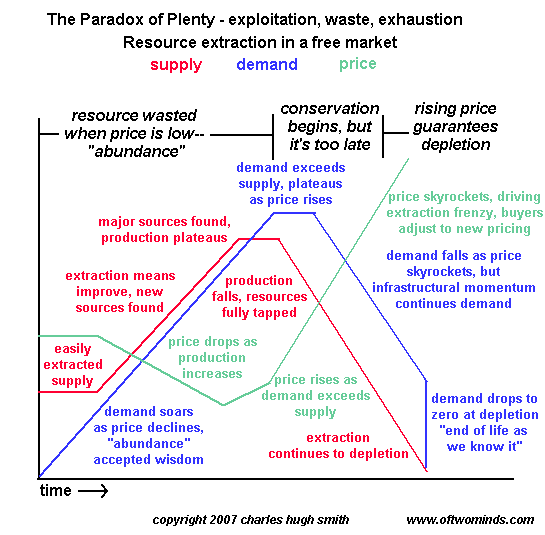
My own favorite example of this process which has been well-documented (and largely ignored) is the over-fishing/stripping of the world's oceans for seafood. Study Spotlights Overfishing In Collapse Of Marine Ecosystems (Science daily) Overfishing Could Take Seafood Off the Menu by 2048 (Scientific American) In 1994, seafood may have peaked. According to an analysis of 64 large marine ecosystems, which provide 83 percent of the world's seafood catch, global fishing yields have declined by 10.6 million metric tons since that year. And if that trend is not reversed, total collapse of all world fisheries should hit around 2048. "Unless we fundamentally change the way we manage all the oceans species together, as working ecosystems, then this century is the last century of wild seafood," notes marine biologist Stephen Palumbi of Stanford University.In other words: when resources appear limitless, we squander them because the price is so "cheap" that conservation "pays no dividend"/isn't worth the effort. Then as depletion begins, prices rise, but the damage is already done. As prices rise further, it drives extractors to harvest the last fish/tusk/drop of oil, etc. Now maybe the fish stocks will recover, but if they do, it's only because the market was limited by government restrictions (establishing protected areas). Where no government intervention occurs, then the fishing stocks are driven to near-zero or extinction. Examples abound (see above); do your own research on the collapse of sea bass off Chile, cod off the Atlantic seaboard, and falling catches in the Caribbean. It would be nice to believe (as in Santa Claus) that the global fishing fleets will magically lay themselves off, reduce their fleets and all agree to protected areas. But the actual facts are that the fleets are just roaming further and dragging bigger and deeper nets to catch what few (marketable) fish remain. (The "unmarketable fish"--some 70% at times--are tossed overboard as chum. That's how you lose an entire ecology and food chain.) Various apologists will instantly stand up to say, "acquaculture will save the day," but but it's not that simple. If you'd like to see "market acquaculture" at work, go to Ko Chang or other coastal areas of Thailand, and look at the huge holes dug to raise prawns. They're dead zones now, breeding pools for mosquitos, because it made market sense to boost the crop with biocides which quickly poison the water and the surrounding soil. And why bother filling in the bomb craters? (that's what they look like) Nobody's paying me to do that, buddy; that's not my job. We also get unforeseen delights like monoculture farm-raised salmon escaping into the wild (there's no market forces restricting that) where they infect the wild gene pool with resistent diseases. None of these after-effects are punished or inhibited by the market whatsoever; as my chart shows, as waste leads inevitably to scarcity, prices skyrocket which drives the increasingly desperate miners/fishermen/elephant hunters/oil extractors to seek out and extract the last resources, as these now command exorbidant prices in the marketplace. (see the market for ivory as an example.) Another excuse is "a substitute will be found as prices climb." There is no substitute for the world's oceans and their complex foodchains and ecologies. A fish farm does not replace the ocean. The market drives right to the bitter end of depletion and extinction, time and again, unless restrained by force--consensual or otherwise. Thank you S.P. ($25) for your generous and thoughtful donation. I am greatly honored by your support. All contributors are listed below in acknowledgement of my gratitude. Are Global Stock Markets Really That Much Higher? April 30, 2007 Amidst the hoopla about record highs in the Dow Jones Industrial Average and many other global markets such as Korea and China (Shanghai Composite), it's worth asking: how are they doing priced in a non-paper tangible good such as gold? Why ask? As frequent contributor Harun I. notes below: "An Asset Is Only Worth What It Will Buy." In other words, if an asset (say a basket of stocks) rises in nominal terms, but it buys less tangible goods, then has it really risen, or was the rise illusory? Let's look at two charts Harun has provided: 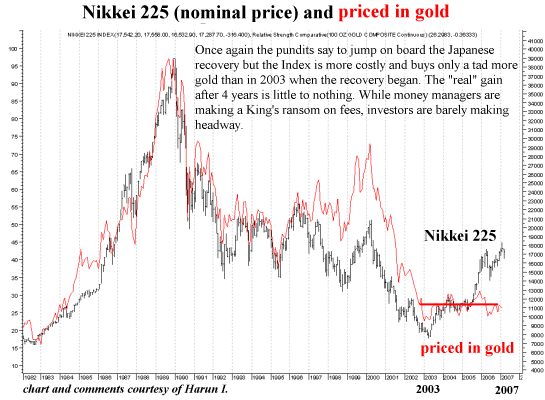
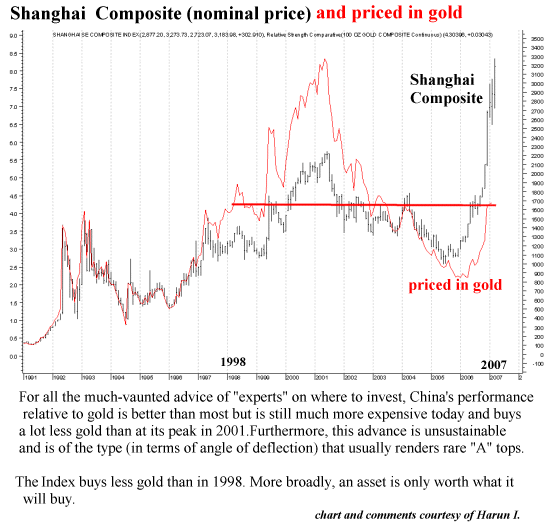
In this "alternative view," the stock market's rise is revealed as being one of numbers rather than actual tangible value. Put another way: if your money buys 20% less than it once did, then a 10% raise isn't an increase at all except in nominal terms. As the calendar turns and the old Wall Street adage to "sell in May and go away" kicks in, the illusion of "record highs" demonstrated above is worth pondering. Thank you R.S. ($30) for your generous and thoughtful donation. I am greatly honored by your support. All contributors are listed below in acknowledgement of my gratitude. To view previous entries in April, go to weblog April 2007. (insert brilliant marketing line here which instantly causes erudite readers to) Your readership is greatly appreciated with or without a donation. Our Financial Contributors Thank you all for your gracious and generous support of this modest site.
I would be honored if you link any essay to your website, print a copy for your own use or add my RSS or Atom feed. And of course I appreciate your recommendations of this weblog and your comments: csmith@oftwominds.com. wEssay noun, combination of 'web' and 'essay,' denoting a short online essay which exploits the hyperlinks, interfaces and interactive capabilities of the World Wide Web; coined by Charles Hugh Smith on May 1, 2005, in Berkeley California. Aphorisms I like: "Economic history is a never-ending series of episodes based on falsehoods and lies, not truths. It represents the path to big money. The object is to recognize the trend whose premise is false, ride that trend, and step off before it is discredited." (George Soros) "The way of the Tao is reversal." (Lao Tzu) "Chance favours the prepared mind.” (Louis Pasteur) "It is neither necessary to hope to undertake, nor to succeed to persevere." (French proverb) "You must have a willingness to do something when everyone else is petrified. You must learn the lesson of following logic over emotion." (Warren Buffett) "Success consists of going from failure to failure without loss of enthusiasm." (Winston Churchill) "May a fair road always be open to you." (CHS, April 2, 2006) All content and images copyright © 2006 - 2007 Charles Hugh Smith, All rights reserved in all media, unless otherwise credited or noted. |
 |

This Week's commentaries
This Month's Journal Essays 05/11/07: The Fort Dix Terror Plot by Harun I. The French Presidential Elections by John Kinsella Wal-Mart, disequilibria, and global economic dislocation by Harun I. The Recent UK Elections by Protagoras 05/05/07: The Evolution of Social Behaviour by Protagoras Is Everybody Happy? by Michael Goodfellow Memories of Lana'i by Bill Murath
Why I gratefully accept donations and why you might want to donate:
Worth Visiting: ilind.net Mish's Global Economic Trend Analysis Marin Real Estate Bubble West Coast of Canada- Housing/R.E. blog New York City Housing Bubble Mortgage Lender Implode-o-Meter (Aaron Krowne) California Housing Forecast View from Silicon Valley Credit Flow Investor Chris Johnston-futures trader Rick's Picks Gold Eagle Econotech SocietyDirectory.org Good Web Directory Satellite Sky Policy/Ideas L.A. Visions Darrell Clarke transpo, planning Authors/Artists John Francis Kinsella author/painter "Letter from Basque Country" Financial Armageddon Michael Panzner The Rhythm of War Terence Parker Bill Murath (chimes & art) buy my novel I-State Lines at The Kaleidoscope (indie bookstore, free shipping) Or from amazon.com: I-State Lines If you want to own gold, I recommend: Buy gold online - quickly, safely and at low prices at BullionVault If you need a quick gift, I recommend: Amazon.com gift certificates Note: at no cost to you, I earn a small commission on purchases made via these two links.
search my site:
|
|||||||||||||||||||||||||||||||||||||||||||||||||||||||||||||||||||||||||||||||||||||||||||||||||||||||||||||||||||||||||||||||||
|
Our retail policy: Nothing is for sale except books/films I recommend and my own novel I-State Lines (via links to Amazon.com and The Kaleidoscope: Our Focus Is You independent bookstore) Free alternative: find them at your local library. Though I earn a small commission on Amazon.com books and gift certificates and gold (BullionVault) purchased via links on my site, I receive no fees for any links, advertising or materials on my site. |
home |